#honkai star rail aventurine analysis
Text
An Aventurine-centric analysis of the HSR 2.1 Trailblaze Quest - Part 1
I recently finished the 2.1 Trailblaze quest while farming for Aventurine, and it literally fueled my brain rot about him so I have to share my thoughts. I’m just going to do some analysis of the parts that interested me the most (so almost all the parts with Aventurine lmao) because I felt like the dialogue was very well-made and full of symbolism and devices that helped build his character. I will do it quest by quest because I don’t think a single post can handle all of my thoughts even if I ignore some parts of the quests. I’ll edit the things that must still be verified when I finish the next post. If you have anything to add don’t hesitate to comment! I love hearing other people’s thoughts on stuff like that. Also I hope the formatting isn't too weird... I'm not yet used to how Tumblr works, especially in website mode, so if anyone's got any tips don't hesitate to drop them too!!
Warning : Spoilers for Honkai Star Rail’s 2.1 Trailblaze Quest “Cat Among Pigeons” (in case some people still haven’t played it yet)
Part 1 : Double Indemnity
Memory
???: Land of rock, but not water, lightning, but not rain, blood, but not tears. You beat us with your falling stars, you lash us with wind and storm, you chew us up with the cracked earth…
→ I think “Land of rock, but not water” comes up as some of the floating text when Aventurine is in Clockie Theme Park (Must verify)
2. ???: I don't ask for a peaceful death, just for you to tell me — does the baby swaddled sweetly asleep... does he dream of his mother's heartbeat and the sound of falling rain? Please tell me whether this life is all just a fleeting dream...
→ Appearance of the motif of rain, which is surely important (Explored in quote 4)
→ Talk about dreams and life, obviously a way to make a link with Penacony, but also probably to show Aventurine’s real character and views : he is not one to hide himself in a false world, which is probably also why he’s so fervently opposed to the Family. (In my personal opinion, maybe all this opulence coming from the Family disgusts him because it reminds him that some people live a carefree life while other suffer needlessly)
→ “Please tell me whether this life is all just a fleeting dream…” is pretty interesting when you consider that Aventurine was ready to sacrifice himself because he saw no point in keeping his life. But also, here Kakavasha’s life is referred to as a dream, something not real, probably to set the stage for his luck, which is also pretty unbelievable but affects reality, setting his existence in the real world. Basically it shows that Kakavasha’s life is solidified by his luck since his birth.
3. ???: ...Otherwise, why would this child be born to face impending death...?
→ Another link to Aventurine’s mentality towards the end of the quest. It’s precisely because he sees no point in being born to suffer that he wants to end his life. (It wasn’t said as brutally in the quest, but in my opinion Aventurine is basically suicidal, as shown by other examples that I will address later.)
4. ???: Darling, listen... this is the sound of rain. On the day you were born, the sky also sent down a gift like this from Gaiathra.
→ The motif of rain is back, yoohoo!! Just before that, Kakavasha’s sister says that the “outworlders”, the IPC probably, sent the rain, but Kakavasha’s mother seems to believe otherwise. Maybe it’s a hint that the religious belief wasn’t as strong in Kakavasha’s sister? However, I feel like this theory is debunked in the next memory. (In my opinion, the theme of religious belief and the loss of it is still super important to Aventurine’s character and I’ll talk about it when it comes up.)
→ I also feel like what makes this event all the more incredible is that it shows that everything Kakavasha dreams of, he can have, to a certain extent. Obviously it’s also to show that he’s the real blessing, but I feel like it’s pretty straightforward here. But what I mean by “he can have everything he dreams of” is that thanks to his luck, nothing is really impossible to achieve, whether it’s good or bad, which he probably realised as he grew up and helped fuel his gambler mentality.
5. ???: ...Welcome to this sad world, Kakavasha.
→ Again, another link to Aventurine’s mentality. The world has been nothing but sad and cruel to him, so why was he even born?
Meeting Sunday face-to-face
Okay little disclaimer here, I struggled a lot with that dialogue because right from the beginning, I felt like Sunday and Aventurine were both trying to one-up another, while also talking about two different things, so it made it very confusing for me, but I feel like that was on purpose. So I’ll try to share my thoughts as best as I can.
Sunday: I have come to know you very well as a person, Mr. Aventurine. You're diligent, generous, and willing to cooperate. The fact that you succeeded in overcoming many obstacles just to meet me gave me the reason to believe in your wisdom and courage.
→ I start off with the most hypocritical thing Sunday would have ever said to Aventurine’s face. Here, Sunday is very obviously buttering Aventurine up, maybe to make him (Aventurine) believe that he (Sunday) can be fooled. Or maybe also to mock Aventurine for thinking that he (Sunday) would let himself be tricked so easily. I think these lines set the tone of the discussion. We now know that this is gonna be a passive-aggressive discussion in which neither Sunday nor Aventurine will be honest. This is also most likely a hint that Sunday knows more than he lets on. Because he knows of Aventurine’s strategy thanks to Ratio and has nothing to lose, he plays the exact same game as him (Aventurine).
2. Sunday: But there's one thing I must ask you — that is, you've used your wisdom at the wrong place to meet the wrong person and put yourself in a situation where you shouldn't be... witnessing a tragedy that shouldn't have happened.
Aventurine: You don't look too well. Am I making you anxious?
Aventurine: ...If not, then it means I'm on your side.
→ First thing that confuses me. Here, Sunday is trying to tell Aventurine that he (Aventurine) has the “bad” role, that he’s doing everything he shouldn’t be doing, and is everywhere he shouldn’t be, but Aventurine just ignores him. I had to re-read that part to understand that he (Aventurine) is trying to steer the conversation in his direction. Sunday is telling Aventurine that there will be consequences to his actions and his behaviour, but he (Aventurine) completely brushes him off by being condescending. And although Sunday is only being subtle, I’m sure Aventurine understands the implicit meaning behind his words, since this is a way of talking he’s familiar with. However, whether he’s aware of the risks or blind to them is something I have no answer to. I struggled a lot with that part because it’s difficult to grasp their intentions, but I think that the deal here is that Aventurine wants to take the high-ground in the discussion by ignoring Sunday.
3. Sunday: If I wasn't mistaken, you'd just made a serious accusation against The Family.
Aventurine: You weren't mistaken, for depravity is creeping in around you.
Aventurine: There's no need for us to be evasive. Let's talk about your sister. Your sister's talent is unrivaled in the world of show business. As you know, her voice has been out of tune since she returned to Penacony. What's more disheartening, she can't sing anymore.
→ Another episode of Aventurine ignoring Sunday to lead the conversation his way. Here, it seems even more ridiculous to me, because Sunday is basically telling him that his actions won’t go unpunished, even if he’s once again not explicit, but he (Aventurine) doesn’t care. He justifies his actions by being condescending and looking down on Sunday, hence the sentence “for depravity is creeping in around you.”. What’s more, he wants to talk about a subject that doesn’t make sense. Why talk about Robin except to say she was a victim? Here, Aventurine is starting his tacting of “fear” that he mentioned to Ratio earlier. Also, more hypocrisy with “There’s no need for us to be evasive” even though he will be only that afterwards.
4. Aventurine: Who could be responsible for this? Many suspect the culprit is among the outsiders, but I know... you hold a different opinion.
Aventurine: Now, your noble status has become a shackle, preventing you from apprehending the murderer and avenging your sister's death. You're feeling anxious because you're out on a limb.
→ Here’s one of my favourite parts. Here, Aventurine doesn’t outright say there’s a traitor in the Family, because it’s too big of an accusation to say without any proof, so he resorts to being as implicit as possible. Here he’s directly contradicting his “There’s no need for us to be evasive” line that was only meant for show. Also, he assumes things about Sunday’s situation, clearly to try and make him afraid, while still being as implicit as possible. However, it’s very likely that he doesn’t actually know what Sunday is thinking or can/can’t do, he’s just bluffing. He’s also very very condescending in these lines.
5. Aventurine: But don't worry. I am on your side.
Sunday: I'm immensely honored by your concern for me Mr. Aventurine — since you're so selfless and generous, I believe you wouldn't ask for anything in return, would you?
→ These guys literally cannot talk to each other normally. Anyway, here they’re both big hypocrites and super condescending with each other. Also, at this point we start noticing that Sunday’s pretty much not phased by Aventurine’s “fear” tactic, which hints at the fact that he expected it, or at the very least has enough control over his situation to not have to fear anything or anyone.
6. Aventurine: Naturally, you wouldn't incur any loss from this. I just want to reclaim what is mine: my liberty, and the personal items under The Family's custody — the bag of gift money, and...
→ I love the first sentence. Aventurine is particularly good at twisting words and sentences to appeal to the ears, and this dialogue really shows all of his prowess as a Stoneheart. He says everything to please, while also finding a way to turn the situation to his advantage, even though it doesn’t work in this particular dialogue.
7. Aventurine: I'm sure you're aware of the high level of risk I'll be undertaking to bring the truth to light.
→ Yet another sentence that makes no sense. In the dialogue, it doesn’t say anything nor serve anything, it’s another one of Aventurine’s tactics. He’s desperately trying to get a hold of the conversation, to have the desired effect on Sunday, so he says things that don’t mean anything, that just hint at things, that leave enough space for doubt to linger in the mind of the person in front of him. Unfortunately, Sunday is already one step ahead, and it doesn’t faze him at all.
8. Sunday: Mr. Aventurine, when you're out and about, do you always make adjustments to your appearance? Your tie should be on the center line, your shirt must not protrude from your vest, your trouser creases should be perfectly straight, and always aligned with the tips of your shoes.
Aventurine: Of course.
Sunday: But I don't, because it's not appropriate to do so in public — you should make sure everything is presentable and in order before leaving the house.
→ I know that this analogy is Sunday’s way of telling Aventurine that he (Sunday) doesn’t like to take risks, but I feel like it also serves another purpose. This seems like an implicit jab at Aventurine’s attempts to take control of the conversation once more, as if Sunday is mocking him for trying to tie the loose ends during the discussion, whereas he (Sunday) came completely prepared. (In my opinion, this is yet another hint that Sunday is one step ahead of Aventurine, but yet again, this is all very implicit.)
9. Aventurine: ...Sure. The gift money is good enough. I suppose you wouldn't mind that? After all, a merchant can't function without a bargaining chip.
Sunday: You compromised quicker than I thought. Unfortunately, it's a gambler that needs a bargaining chip... not a merchant. I can give you your gift money, but before that, I want you to tell me —
→ I don’t have a full answer to the question “What is the difference between gambler and merchant in relation to Aventurine?” but it dwells on my mind nonetheless. Aventurine refers to himself as a merchant again later (Must verify) but this dialogue is the only moment where he’s called out for it. So, why? Merchant here seems too… plain. Not risky enough for Aventurine. A merchant sells, but it’s mostly honest and without any lies, which matches with the image Aventurine usually gives out : he’s someone trustworthy, just agree to work with him and it’ll be good for you. However, Sunday sees through that facade easily, and denies Aventurine’s false honesty and care. Gambler is almost used as an accusation here, like Sunday is calling Aventurine out on his lies. And indeed, Aventurine does fit the image of the gambler : he’s reckless, enjoys the thrill of the risk, and doesn’t hesitate to play dirty. Even Ratio refers only to him as “gambler”. As for the bargaining chip… it probably fits the gambler more because a gambler is someone who’s in a difficult position and needs a way to escape, to change the tides, which will be Aventurine’s case soon.
10. Sunday: "Oh, Triple-Faced Soul, please sear his tongue and palms with a hot iron, so that he will not be able to fabricate lies and make false vows."
→ Nothing special here, except that it’s quite interesting that Xipe is referred to as the “Triple-Faced Soul” and Gaiathra Triclops is a goddess with three eyes. But it’s most likely just a way to make a parallel between Sunday’s and Aventurine’s beliefs and how the former pushes his Aeon’s creed on the latter. Especially since the Avgins believe making any offering other than saying the prayer is tainting Gaiathra Triclops’ name, whereas the Family is actively nurturing a dream city all in the name of their Aeon. Additionally, here Sunday associates Xipe’s name is with acts of torture nonchalantly, which shows that the Family probably commits horrible acts that they justify with the name of the Harmony regularly. (In my opinion this is another reason why Aventurine dislikes the Family and Penacony as a whole.)
11. Dr. Ratio: You'll have to speak more clearly than that.
12. Aventurine: ...You might as well explain yourself a little more clearly.
→ Adding these two together even though the first one was said during the flashback with Ratio and Sunday, because I thought the similarities were interesting. Put together, these two lines really make it seem like Sunday tricked Ratio and Aventurine by pitching them against each other. Still, Aventurine’s line is obviously less assertive because he doesn’t have any possibility to back out, unlike Ratio had.
13. Aventurine: Is this what the Harmony represents? Is it built upon constraint and coercion?
→ Here’s a line that convinces me that Aventurine despises the Family. He mimics Sunday, who says the Harmony’s name to justify his doings, and calls him out on his hypocrisy. It isn’t a real argument, it seems more like a sudden burst of Aventurine’s hatred for the ways of the Family, but it definitely sets the stage for the opposition between Sunday’s and Aventurine’s beliefs more clearly.
14. Sunday: Should you succeed, you will be able to coalesce into the Harmony and be with your Family. If you fail, you will suffer the wrath of the Eternal Centurion and fall into an abyss of doom.
→ That line… That line man… The first sentence is amazing. Throughout the whole quest, I feel like there's this recurring theme of Aventurine being stripped from everything he has, and this is definitely part of it. There’s something so oppressive and sickening about the fact that if he fails, then the last bit of himself, of Kakavasha, which is his memories of his family, will be overridden by his Family. And I say his Family because Sunday says your Family and not the Family. And while technically it’s the same, the fact that Sunday says “your” really makes the situation fully set in stone. Even if Aventurine is free, he has already been stripped away of all the connections he has to his true self. Even his belief in Gaiathra Triclops, which is unique to his clan, is going to be submerged by the words of an Aeon he does not believe in. Even worse, his beliefs will be overridden by the words of a faction that justifies their violence and lies with the name of their Aeon. This is a fate worse than death for Aventurine, because it wipes out his being, his existence, everything that makes him himself. This is literally akin to being a slave once more. Anyway these are the most hurtful lines in that dialogue I’m telling you.
15. Aventurine: Shameless hypocrites... You took everything from me and still demand the truth? That isn't fair. Your carnival reeks with the stench of cash. Nothing is achievable without it!
→ Last one for that dialogue, it’s not too complicated, but I love the raw anger that comes out from it. It definitely feels like this is what Aventurine feels at his core, and he finally lets it out now that he’s being threatened with the loss of his person. The “You took everything from me” references both material things but also himself. This line is so honest because he already feels as if he is caught, as if he is being stripped of his identity, all because of the Harmony’s effect on him. Also you remember how I mentioned that Aventurine probably hates the Family because of the opulence of Penacony. Yeah well that’s the proof right there. He says “reeks” and “stench”, which both have a negative connotation, to underline how horrible the Family’s dreamscape actually is. And since these words are very strong, I’m guessing that they come from his real feelings about the Dreamscape and the Family.
Memory 2
???: Look, this is just a necklace. But Kakavasha, you are my only family.
Kakavasha: …
Kakavasha: I'm sorry, Sister... I thought you'd be happy. Because mom left you this necklace...
→ These lines aren’t really complex, but they really show how Kakavasha probably had no knowledge of his worth, even as a kid. I don’t know why that is, but living on a dangerous planet and being a kid that can’t really fight or help probably is part of it. However, his sister reminds him that he is worth more than a necklace. Still there’s more parallelism between Kakavasha and the necklace. He says “Because mom left you this necklace…”, but his sister’s first line “you are my only family.” shows that Kakavasha is another gift that their mother left to her, one that is more important than a material possession, yet he fails to realise that.
2. ???: It is important, but not as important as you, my dearest brother... I don't blame you, but you must remember what mom said...
???: Pain and poverty are the trials of Gaiathra Triclops. SHE has also granted us a chance, and that's your good luck, Kakavasha. Your good luck is the most precious wealth we— all Avgin have.
???: You're a child blessed by Gaiathra Triclops and can lead the clan to happiness. So, always remember to protect yourself and never resent the pain and poverty you're going through... All right?
→ There’s honestly something a bit messed up about Kakavasha’s family’s adoration for his good luck, to the point the lines almost make it seem like he’s more important than the necklace because he’s lucky. Obviously I don’t think Kakavasha’s family’s love for him was dependent only on his luck, and nothing tells us that these memories are completely true either. Since it’s all Aventurine reminiscing, he could be an unreliable narrator, especially with his super low self-esteem. However, all about his life is said to be related to Gaiathra Triclops and her divine influence, whether it’s the hardships or the good things. There’s definitely some form of fatalism in Kakavasha’s sister’s words, with pain and poverty being justified with a sort of “everything happens for a reason”, which probably fueled Aventurine’s vision of life, death, and hardships. Especially since these lines also show how difficult Kakavasha’s role was. He’s both the saviour of the Avgins, a blessing from Gaiathra Triclops that can help everyone, but he also has to be selfish and protect himself to keep the blessing alive. This probably fueled his bad view of his luck, but also his self-hatred : because he’s lucky, he has to stay to the side and let everyone die, meanwhile he gets to stay alive, but does he deserve it? Also, in the previous memory, I suggested that maybe Kakavasha’s sister’s beliefs weren’t as strong as their mother’s, but her words here prove the opposite. Kakavasha’s birth and luck probably reinforced her beliefs, since he’s the hope all the Avgins have been searching for ; it’s like their goddess is finally answering their prayers, so why stop believing in her now?
3. Kakavasha: ...Okay. I will swear to Gaiathra Triclops to protect this "wealth"...
→ Not much to say here, except that despite swearing to Gaiathra Triclops in the past, currently he sees his luck in such a bad light that he doesn’t think it’s a blessing, and doesn’t want to protect it anymore. Obviously this fact is related to how much he’s been isolated from all the other Avgins because of his luck.
4. Kakavasha: But Sister... If Gaiathra Triclops was really watching over us...
Kakavasha: Then why did SHE not protect Dad when he was swept away by the quicksand...? After all, Dad went to the Katicans' land only to prepare for Gaiathra Triclops' offerings…
Kakavasha: And where was Gaiathra Triclops when Mom was shivering in our arms? Mom was still pleading for Gaiathra Triclops' forgiveness under her breath until the moment she closed her eyes…
Kakavasha: Sister, everyone praises me for being smart, but I don't get it... If every rainpour was Gaiathra Triclops' forgiveness and grace…
Kakavasha: Then how bad were our sins? ...So much so that we were born in this world of death...?
→ I’m putting this whole speech together because it makes much more sense as a whole than separated. Here, we really see Kakavasha’s doubt towards his clan’s religious beliefs, but also the uncertainty he feels about his role. But because he still believes in Gaiathra Triclops, this leaves him with only one option left : wondering what these trials are an answer to. The last line pretty much confirms that his role as the saviour of his clan and all the bad things that happen despite his luck created his point of view on life and death. He doesn’t blame Gaiathra Triclops, but thinks that maybe there is no point in hoping for her forgiveness if there are so many trials thrown their way. But also, it probably made Kakavasha wonder what was so special about himself, and eventually if he even had anything special, considering his luck can’t help anybody except himself. Because of that, I also think that these words are a mix of Aventurine and Kakavasha’s thoughts. I’m not trying to undermine Kakavasha’s ability to understand the world, but the “where was Gaiathra Triclops when mom was shivering in our arms?” seems so accusatory that I’m thinking that it could be a thought that Aventurine has now that he grew up. Also, the fact that there’s no image when this text is on screen supports this theory : Aventurine can’t link these thoughts to a precise moment he had with his sister, because they’re his current thoughts about his memories.
#honkai star rail#hsr#honkai star rail 2.1#hsr 2.1#honkai star rail penacony#hsr penacony#honkai star rail aventurine#hsr aventurine#honkai star rail kakavasha#hsr kakavasha#honkai star rail sunday#hsr sunday#honkai star rail dr ratio#hsr dr ratio#honkai star rail analysis#hsr analysis#honkai star rail aventurine analysis#hsr aventurine analysis#honkai star rail dialogue analysis#hsr dialogue analysis#honkai star rail sunday analysis#hsr sunday analysis#honkai star rail kakavasha analysis#hsr kakavasha analysis#honkai star rail quest analysis#hsr quest analysis
28 notes
·
View notes
Text
Female Guidance in Aventurine's Life

One thing I haven't seen discussed in much depth yet, but which I think is especially interesting, is the consistency of female guidance in Aventurine's life: Every single person who we have seen on screen offering Aventurine assistance or making a positive difference in his life is female (with one exception, yes, I'll get there).
Under the read more cause it's longggg:
Before even diving into his family, let's just get the obvious out of the way: Aventurine is, at least supposedly, blessed by a goddess. The very origin of his good fortune--be it actual blessing or curse--comes from the literal "mother goddess" who watches over him. This is one of the only instances in Star Rail where a god character is specifically given a gender, and Gaiathra is not ever ambiguous. She is the classic female fertility goddess with all the trappings of other famous triple goddess figures of the real world. Aventurine's personal belief in the goddess may be shaky, but he nevertheless continues to treasure his people's faith. Thus, at the core, we can say Aventurine is a character who is guarded by the most quintessential mother figure possible.
Now, with the most obvious out of the way:
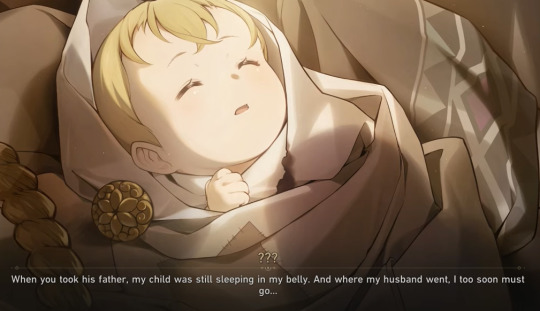
We know that Aventurine's father died before Aventurine was even born, and therefore he would not have any memories of his father, leaving him to be raised by his mother and sister.
Both women clearly made an enormous and lasting impression on Aventurine; they haunt every single one of his memories of Sigonia and are the key elements of the family Aventurine longs to return to. While he flirts with the concept of death as a way to see his family members again, it was also his mother and sister who instilled in him any sense of self-worth and meaning to his existence, the only things keeping him from giving up on living. His mother believed him to be blessed; his sister insisted to his face that not even the only remaining remnant of their mother had any value in comparison to his life.
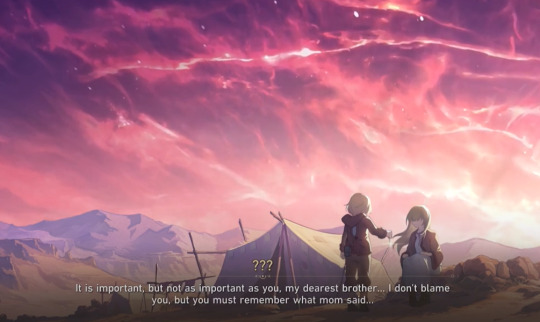
It is for his sister that Aventurine first begins expressing a self-sacrificial nature, and from his sister that this self-sacrifice is reinforced when she uses herself as a shield to help him escape massacre at the hands of the Katicans.
It is also from his sister that Aventurine learns many of the deeply meaningful actions he holds onto to the present day, despite having been so far removed from his own culture.
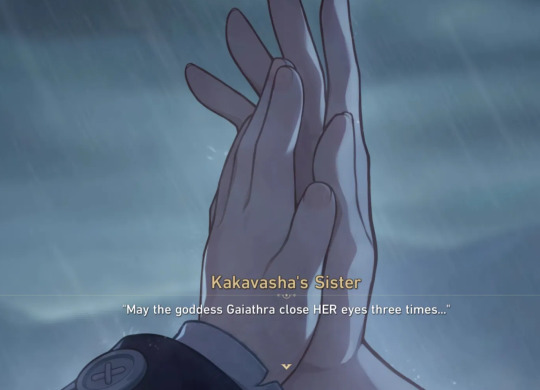
Conversely, every one of Aventurine's early negative experiences on screen appear to have been driven (at least primarily) by men.
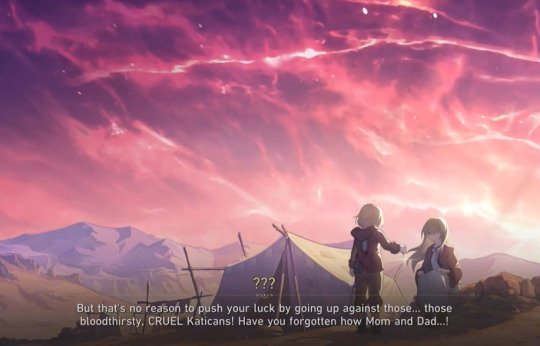
Although the Katican tribe of course would have both men and women, the tribal societies on Sigonia appear to be on the fairly traditional side, with Aventurine's mother staying at the camp with her child while his father was the one to go out and hunt for offerings for Gaiathra. This is also supported by Aventurine asking Jade to take him to her "chief" later on. Therefore, it is likely (although of course not guaranteed) that a majority of the Katicans' army was male, and that Aventurine's early experiences with outsiders consisted almost entirely of indiscriminate pillaging and massacre at the hands of what the Avgin viewed as savage, invading warriors. In separate instances, Aventurine was traumatized by these warrior figures three times--first with the loss of his father, then his mother, and then finally his sister.

And even their hope, supposed to come in the form of the "men in black" from the IPC, completely abandoned them, leaving Aventurine once again betrayed by masculine figures that were supposed to be there to protect him. Led by Oswaldo Schneider, another cruel male authority figure, the Marketing Department of the IPC permitted the wholesale slaughter of Aventurine's people--something which we know Aventurine is now aware of.
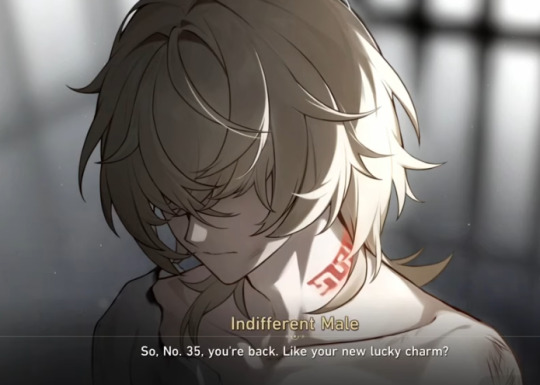
Then, of course, the next piece of Aventurine's backstory we're given is his male slave master. I don't really need to say anything about this, do I? This man violated Aventurine's human dignity and bodily autonomy, and forced Aventurine's hand in a life or death battle for which Aventurine still punishes himself mentally, even years in the future.
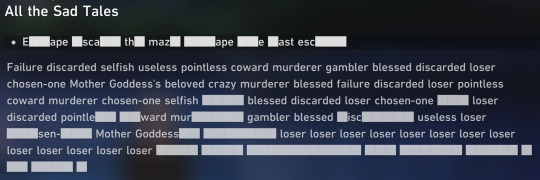
In part to escape the difficulty of his situation and rise to a position where he would have enough resources to--he thought--help his people, Aventurine joins up with the IPC. But when he attempts to make contact with a powerful man in the organization, Diamond, he is instead met by a woman, Jade, who against Aventurine's own expectations determines that she will raise Aventurine up (or use him as a tool, depending on how you currently choose to interpret Jade's motivations), granting him wealth and status beyond his imagination.
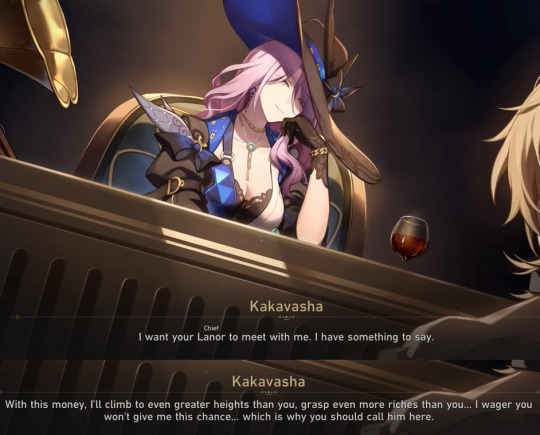
(And this line in particular is interesting, because you can take it one of two ways: 1) Aventurine comes from a patriarchal planet that traditionally put men into positions of power [thereby making his own slavery an emasculating act, aligning him further with disenfranchised women]; thus, he is making the assumption that to get anywhere in this organization, he will need to work with a man; or 2) He actually was counting on Jade taking his bet and helping him right from the beginning, because Aventurine perceives women as inherently more likely to protect and aid him than men would be.)
In the end, Jade does exactly as she claims she will, launching Aventurine into a position of power while also closing golden handcuffs around his wrists. She positions herself not only as his supervisor, but as his advocate and ally. She entrusts him with her Cornerstone, a sign of significant faith in his abilities. She even seems to be keenly aware of his bias towards the mother figure, referring to him as "child" in their conversations.

Whether this is genuine or a manipulation tactic can certainly be debated (and I'm not inclined to think at this point that Jade is a genuinely good role model or selflessly supportive person in Aventurine's life), but whatever the case, women are the only people Aventurine even remotely considers to be "in his corner."
We see this even earlier, in Aventurine's call to Topaz. Like with the example of his mother and sister, Aventurine trusts in Topaz's ability implicitly, and considers her above anyone else when it comes to completing the mission in Penacony.
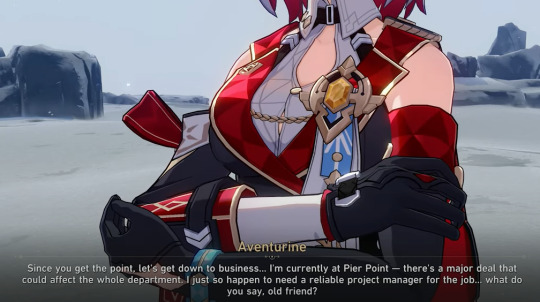
Although of course we don't know if Aventurine has any other friends or allies among the Strategic Investment Department, it seems very likely that Topaz, yet another woman, is the one he is closest with. At the very least, she is the only IPC character (so far) that Aventurine has a complimentary voice line for, one that shows his respect for her talent:

Over and over again, the story aligns Aventurine with female figures in positions of authority, and demonstrates that he is comfortable (although maybe not too comfortable, in the case of Jade) with relying on them and trusting their judgment, just as he did with his mother and sister.
And this pretty much goes off the charts in Penacony, where Aventurine has more involvement with the female cast than virtually any other non-female character (even the Trailblazer!). We set the pattern off right away, with Aventurine immediately being placed into a negotiation situation with Himeko, respecting her role as the Express's leader and working to get himself aligned with the Express by acquiescing to her request for support.
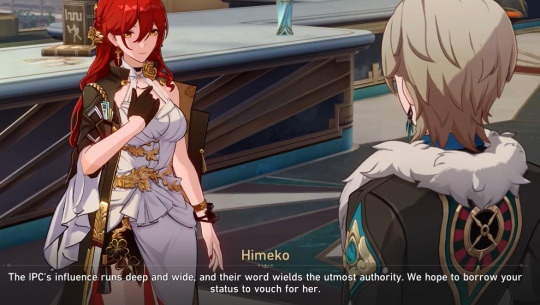
Then there's the fact that Aventurine is the one who finds Robin's body, an event which, although he didn't let it show too much, was almost certainly traumatic for him, given the violent death of his own sister.
Next, twice in Penacony's story, we see Aventurine seek out Sparkle for information. He may not personally like her and her comments may be both racist and dehumanizing, but Aventurine does rely on her--being the only character explicitly seeking her aid, which no one else in Penacony seems to want.
In 2.0...

And in 2.1.
Now, say it with me, guys: Aventurine built an entire portion of his grand plan around the idea that if he looked pathetic enough, a female character would absolutely come and help him. And sure enough, the women come through for him, always! Sparkle gives him the exact last clue he needs to confirm his belief that he could use "Death" to reach the true Penacony, sealing the deal for the rest of his plan.
His plan which also hinged significantly on Black Swan's involvement too, another woman that he views as, if not trustworthy, then at least intelligent and hyper-competent.
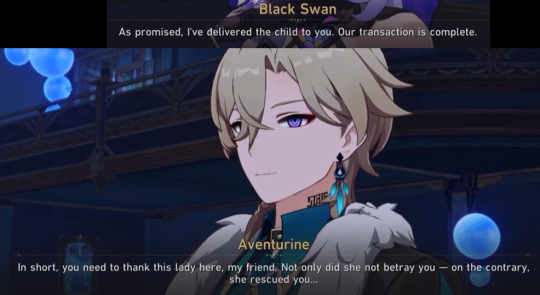
Contrast all this, of course, with the treatment Aventurine receives at the hands of Sunday, the lone opposing male character he faces in Penacony.
Sparkle implies that Sunday would humiliate Aventurine in an unmistakably sexual and degrading way, and Sunday himself professes this same desire to see Aventurine humiliated.
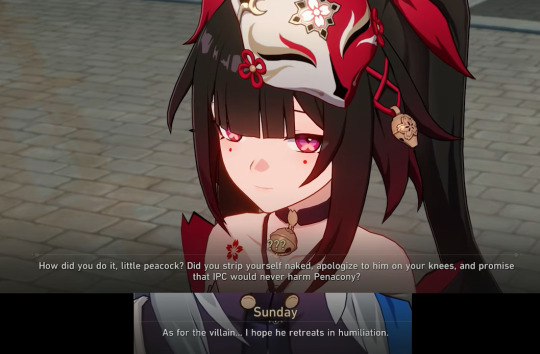
Then we're "treated" to the moment in which Sunday uses the Harmony's (or perhaps actually the Order's?) power against Aventurine, in a scene which is supposed to reflect an interrogation but is also, very clearly, another nonconsensual violation of Aventurine's bodily autonomy and dignity by a man. While ostensibly seeking confirmation of the Cornerstone ruse, Sunday instead subjects Aventurine to unnecessary questions about his past on Sigonia, which recall and force Aventurine to re-endure memories of his trauma.
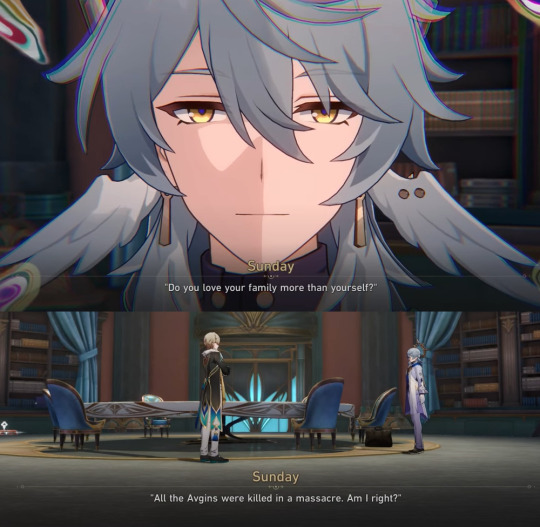
Even if this is what Aventurine prepared himself for and planned to have happen, the pain he experiences is very real, and he suffers both the physical and emotional consequences of Sunday's assault all the way up to his "Death" and possibly even beyond.
(Also, Sunday fans please don't get too up in arms with me for this; I also like Sunday! It's okay for characters to be morally grey!)
I think there's one other interesting example I would bring up here too, and that's Aventurine's conscious decision to weaponize his own masculinity against the Trailblazer. Through the 2.0 and 2.1 Trailblaze missions, Aventurine deliberately acts in an off-putting manner to the Astral Express crew, particularly the Trailblazer, in order to build up to the 2.1 climax where the Trailblazer is supposed to view him as an unrepentant villain and attack him without hesitation.
In order to achieve this uncomfortable, villainous effect, what does Aventurine do? Exactly what other men have done to him.
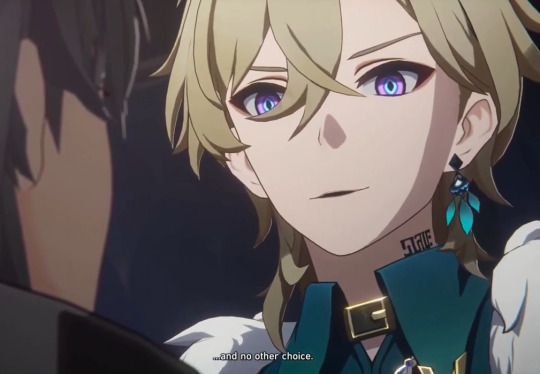
This is especially apparent if you're playing Stelle because of the ingrained societal taboo of a man entering a woman's personal space without consent, but even as Caelus, it is very clear that Aventurine is leveraging behaviors typically used to show dominance: In a complete 180 to all Aventurine's other body language in the game (normally quite withdrawn, frequently in defensive postures with his arms crossed or hand behind his back, almost always standing several feet away from other people), Aventurine violates the Trailblazer's personal bubble, looming over them (Caelus was sitting in this cutscene, lol), forcing eye contact, and commanding the space while informing them that they will have no choice.
For someone who was hunted, enslaved, had his movements restricted with chains, and due to his own slight stature has very likely been towered over by others who were intentionally asserting their power over him all his life, it is clear that Aventurine associates dominant, typically more masculine-coded physically-imposing behaviors with discomfort and even villainy.
Any girl who has ever had a man loom over her like this will realize very quickly: Aventurine wanted to make himself scary so he made himself act more like a bad man.
(Yes of course I know "not all men." I'm not saying every man behaves in this domineering way or that women cannot be domineering too, obviously, just that Aventurine had a very specific image in mind when constructing a "villainous persona," and the physically controlling tactics most typically used by aggressive men toward women was his immediate go-to.)
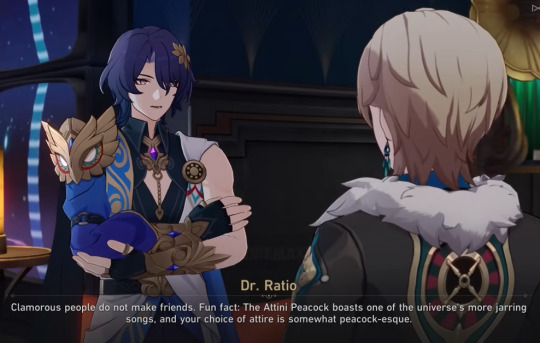
But where does that leave Dr. Ratio, the one male character actually on Aventurine's side?
Frankly, I don't want to derail my post about how intensely Hoyo chose to hammer on the message of "Women will protect you" in Aventurine's story with a discussion about a mlm ship, but the take-away here is going to lead in that direction anyway--so yes, Dr. Ratio is the exception.
What is interesting is that he does not come across as an exception at first, and in fact initially appears as another male character being rude and dismissive to Aventurine. Like, there are still people out there calling Ratio an unrepentant racist for this one.
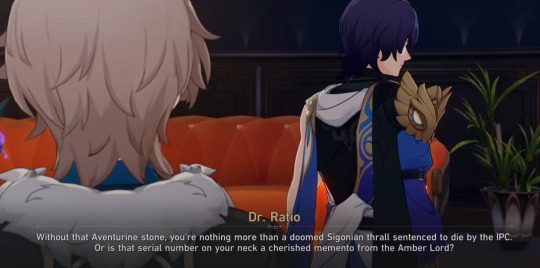
Of course, it's later clarified that this is an act--likely even these insults were scripted specifically to give Sunday's spying ears the "insight" he needed to exploit Aventurine during the interrogation.
But even though it is an act, Aventurine still has noticeable trouble putting his faith in Ratio. He does genuinely doubt him a few times, despite knowing that they are working together to fool the Family.
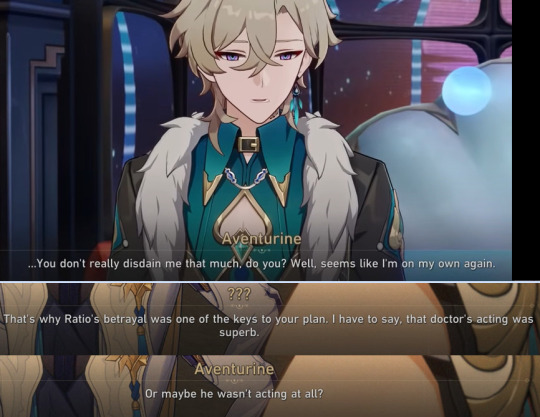
Even his voice line about Ratio confirms that he doesn't think Ratio particularly cares for him; rather, he thinks Ratio simply tolerates him because he's slightly less unintelligent than those around them.
Ultimately, the entire act with Ratio ends up being a mirror of the real scenarios Aventurine has been experiencing with men his whole life (at least as far as we are shown his life). Men abandon him to fend for himself (unwillingly, like his father, or willingly, like Diamond leaving Aventurine to deal with Penacony alone on the inside). Ratio keeps leaving Aventurine completely alone. Men attempt to humiliate him and violate his boundaries (like Sunday and his slave master). Ratio insults Aventurine's appearance and intelligence repeatedly. Men betray him (like Oswaldo Schneider and his men leaving the Avgin to die). Ratio "betrays" him.
I'm not saying when Aventurine devised the plan for their act, he consciously drew up a list of all the ways men had hurt him in the past and had Ratio re-enact them one by one, but like... that's what happened, whether or not Aventurine intended it.
And okay, the shrinking scene in Dewlight Pavilion was just for fun and probably only slightly fetishy, the devs promise; yes, it was supposed to be a joke! ...But it's also not a mistake that this is yet another instance of a male character in a glaringly metaphorical position of power over Aventurine. Aventurine's tiny in this scene! He's completely vulnerable! He's in a dangerous position and the male character could very much hurt him in this moment.

But Ratio doesn't. (In fact, his line here is supposed to be sarcastic, very ha ha--but also, what is Ratio really saying? "I won't do anything to you without your express consent." What a good guy.)
Virtually everything negative that we see in 2.1 is Ratio doing these things as an act at Aventurine's own request. He doesn't actually disdain Aventurine; his own voiceline about Aventurine reinforces that he sees Aventurine as talented and intelligent.
Whatever you think he was apologizing for in their early scene, he's the only person we're ever shown in-game apologizing to Aventurine at all.
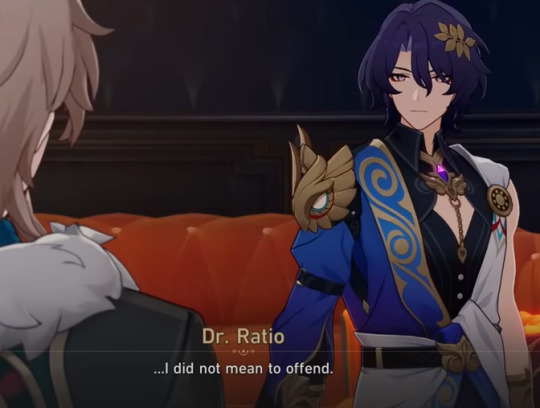
He worked hard to "betray" Aventurine but only as he was instructed to do, and immediately checks in on Aventurine's well-being afterward, even urging him to give up the plan if it becomes too much to handle.
And then, of course, there's the note: "Do stay alive. I wish you the best of luck."
After this point, it cannot be denied that Ratio is unequivocally on Aventurine's side, wants to help him, and is not doing so out of any sense of self-gain but largely because he is a good person who simply cares about Aventurine's fate. By the end of 2.1, it can no longer be doubted that Ratio is the exception to the "gender rule" of Aventurine's life, which--the story shows us again and again--was that guidance, protection, and care for Aventurine come from women, while men repeatedly represent dismissal, betrayal, or pain.
Ratio is, at least as far as Aventurine's story shows us, the proof that men can be good, that things are not as black and white in Aventurine's life as they might appear, and that--if you do choose to ship him with or see Aventurine as attracted to men--his attraction could be validated (and potentially reciprocated) by a male figure who would not bring additional harm to Aventurine's life. Aventurine makes the final decision to live after seeing Ratio's note--the exception to the rule ultimately proves to be the last piece needed to keep him alive.
But I promised I wasn't going to derail my own post about w o m e n, so let me get to the final point, and the one I really wanted to talk about: Although Ratio gets virtually all the credit for "saving" Aventurine in the fandom, Aventurine was actually saved by, you guessed it, another woman.
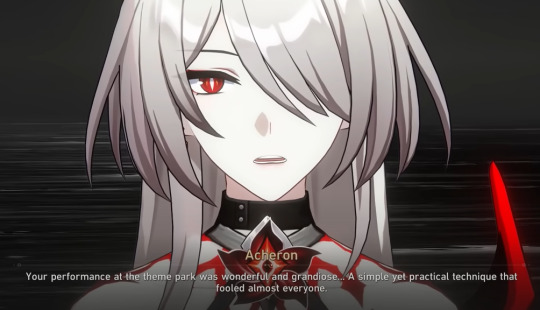
Not going to lie, the reason I started this post was specifically because I wanted to talk about how Acheron and Aventurine's dynamic was completely unexpected but actually fits flawlessly with the theme of feminine guidance in Aventurine's story.
Despite the fact that Aventurine made Acheron's life much harder and actively used her as a chip in his grand gamble, she doesn't blame or chastise him for those actions. Although she expresses some incredulity that Aventurine is actually that lucky, she then turns around and congratulations him for his ingenuity, immediately supporting him despite the fact that they don't even truly know each other.
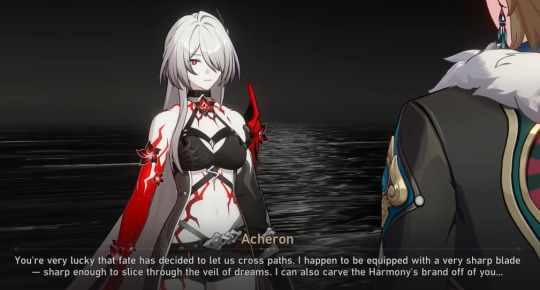
Then it gets even more interesting. Acheron, who frequently hits her companions with deep and sometimes very emotionally fraught questions, asks Aventurine: "Have you never wavered?"
We as players know for a fact that Aventurine is constantly wavering, constantly doubting himself, his luck, and whether he'll even live--or even wants to live--to see tomorrow. But we also know that Aventurine is not forthcoming about those truths, refusing to express them to anyone, even himself. The only way we hear those dark truths is through his "future" self (who by the way, is once again another male figure cutting Aventurine down--of course it's himself but it's also, from the player's perspective, once again reinforcing the message that he isn't going to find safety or kindness in an adult male presence). Aventurine almost constantly deflects and diverts when his emotions or struggles are brought to the fore (unless he's divulging them for the specific purpose of allowing someone else to weaponize them). "I'm fine," he says, like a lying liar who lies.
But he doesn't lie to Acheron.

He chooses to be completely candid with her, to lance open the deepest wound of his life--that he can win and win and win and still have lost everything. The glitz and the glamour has all been stripped away here, at the end of everything, and Aventurine finally feels safe enough to admit that he fears he has absolutely nothing in his life worth living for.
And then, we get this direct parallel: Aventurine looks to Acheron, the woman now before him, for guidance, for explanation, exactly as he looked to his sister in the past.
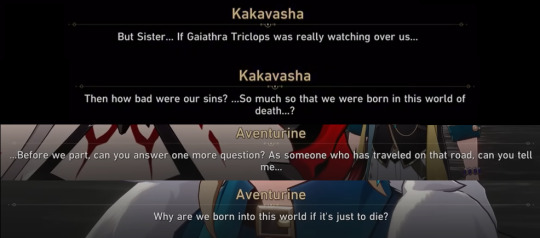
He needs help, he needs answers, and he is continually seeking that help from the female figures in his life, whose support and kindness echo the lost care of his mother and sister.
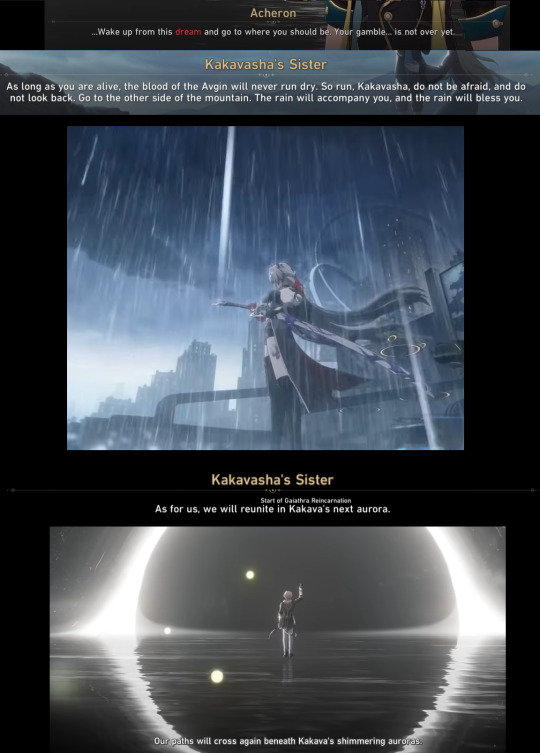
"Go where you should be," Acheron tells Aventurine, guiding him across the river of death just as his sister insisted that he flee through the rain toward life.
Look guys, Acheron's even the one who reminds Aventurine to look at Ratio's note in the first place because apparently being an emanator of Nihility gives you x-ray vision, but my girl just gets no credit at all for being Aventurine's real savior, come on now!! Yes, Ratio's note was the final reminder Aventurine needed that someone would be waiting for him on the other side, but Aventurine would never have even gotten to the point of being willing to read that note if Acheron hadn't stepped in and provided him an answer to his question.
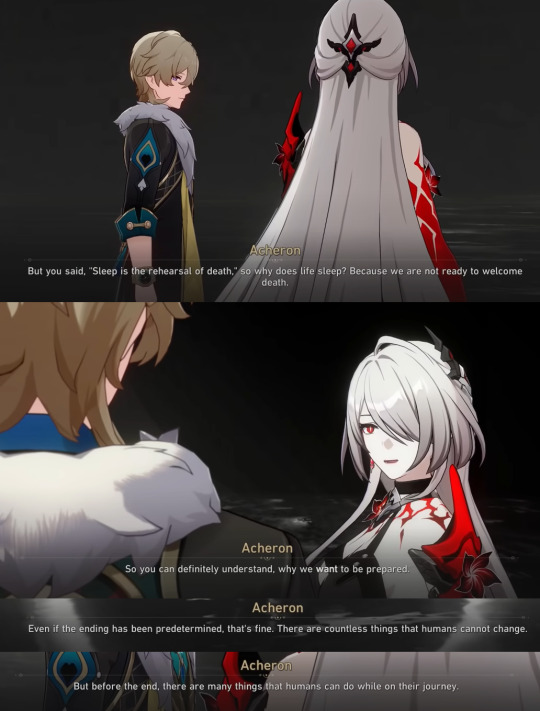
She feeds him back his own answer: "Why does life slumber? To rehearse the death for which we are not currently prepared." It is Acheron who reminds Aventurine that giving into the Nihility is pointless, and that rather than simply embracing a meaningless death, it is up to humanity itself to find and make meaning by living. It's this, not Ratio's note, that Aventurine gives as his reason for choosing to go on when asked by his own younger self. It's Acheron's words that finally give Aventurine an answer--why do we live just to die? Because there are people we can still make proud. Because when we go into death, we should do so with our heads held high, having achieved our own sense of purpose in this life.
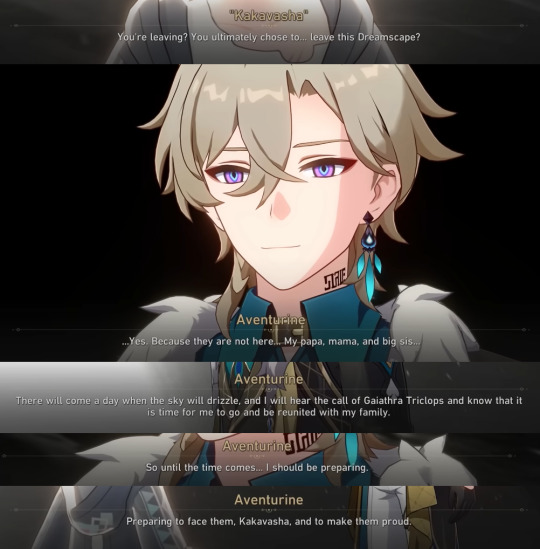
Ratio gave Aventurine a promise: Someone is waiting for you to come back.
But Acheron gave Aventurine a reason: If life is inherently meaningless, doesn't that just mean you are free to give it meaning yourself?
She saved him, as women have been saving him all his life.
Anyway, this has already been horrendously long, but really what I wanted to say is that I think it is absolutely fascinating how consistent Aventurine's writing is when it comes to portraying where his support comes from and who he seeks guidance from. (Psst, just in case you still haven't figured it out, it's women!) In virtually every instance we are shown, we see the message reinforced that women are Aventurine's greatest allies and role models, while male figures are continually positioned to intentionally or unintentionally let him down and cause him distress.
"But women playing the supporting role to a male character is nothing new, Star, why are you so excited by this?"
Because the role women are playing in Aventurine's life is not the subservient supporter and emotional crutch role that female characters all too often play to male counterparts. None of the women in Penacony or Aventurine's past were there to do the emotional labor for him, to be a trophy or prize, or to cater to his needs. They don't exist solely to help him fulfill his character motivations; they aren't following him around waiting for his next request as their only role in the plot.
Instead, with Aventurine's story, we almost have an inversion of gender roles, where the male character eschews the stereotypical "men are leaders, fighters, and stoic heroes" archetype. Instead, no matter how hard he tries to hide it and keep a stiff upper lip, it is clear from 2.0-2.1's story that Aventurine is a deeply insecure, lonely, and explicitly traumatized survivor of genocide, slavery, and exploitation. Unlike most male characters, who are very rarely portrayed as genuine victims--because come on, shouldn't men be strong enough to fight back? Shouldn't men be able to shrug it off when they are hurt, emotionally or physically? (Of course I'm rolling my eyes here!)--Aventurine is belittled, humiliated, emasculated, and victimized on-screen, roles almost exclusively reserved for women, for whom surviving victimization in fiction is seen as noble.
Meanwhile, the women in Aventurine's life take on the roles traditionally given to male characters. They're both emotionally and physically his protectors. Aventurine's sister gave her life to guard his safety; Acheron ensured he could safely pass beyond the river of Nihility into the Primordial Dreamscape. They give him the tools necessary to succeed where he could not succeed on his own. His plan could never have gotten off the ground without Topaz and Jade entrusting their Cornerstones to him. The knowledge and capabilities of the women around him--not their "feminine charms"--are what allow them to help keep Aventurine on the right path even though he does waver. Even women who disrespect him, like Sparkle, still play a positive role in his life, able to provide him insight gained with their own intellect and talents.
When he has no one to rely on and doesn't know what to do, Aventurine is able to continually turn to the women around him, asking for and receiving not servitude or fawning, but their genuine wisdom and guidance.
tl;dr: If nobody else has him, Aventurine knows this random woman he met two minutes ago on the street will have him, because the women in his life literally never let him down.
(It's just so, so good, and ultimately, it should be very clear why Aventurine's story is as popular with women as it is! A+, Hoyo!)
#honkai star rail#aventurine#acheron#topaz hsr#honkai star rail meta#character analysis#there's a bit of#ratiorine#in here too#but mostly I ramble about WOMEN#thematic parallels#thematic parallels everywhere#it's long#I'm sorry but not really#sometimes you act like a normal fan#other times you're me#and write essays that wouldn't be out of place in gender studies class#also I hit the '30 images per post' limit and had to make do#please ignore the terrible merging I did of the photos#don't perceive my MS Paint job
498 notes
·
View notes
Text
DR RATIO ANALYSIS PT 3 BUT IT'S JUST GAY
Now, you might be saying - "Aurae, you've done part one, and part two, so why do we need a part three?" The answer is because of two things - one. I made a deal with the Tumblr Peoples that if one of my posts hit more than 50 likes I would do this analysis. Two. Mihoyo is making this shit canon. I CAN'T MAKE THIS UP. So, let's delve into my usual disclaimer, as we might have some new people joining us for the first time with my insanity.
I have been researching psychology personally for about six years, so although I am not a professional (crawling my way there through the education system. I will be one, one day.) I do have some experience with analyzing homosexuals. Psychology hours, my children. They don't call me "chronically cooking" for nothing. Maybe I should change my url to that...
NOW THAT MY LONG AHH DISCLAIMER IS OVER, LET'S GET INTO THIS! It's time to deconstruct these homosexuals like a modern airplane, because they might as well be taking off with how canon they are.
"It can't be canon," they say, but then Mihoyo DOES PAID SPONSORSHIPS WITH THESE FUCKERS BEING GAY. We've all seen the paid partnership edit. We've all seen the video where Aventurine has the audio of "nice rack" as he talks to Dr. Ratio. PAID SPONSORSHIPS. Now, if that piece of evidence isn't enough for you - let's dive into their actual relationship, which is just a HOMOSEXUAL MESS. I will be focusing more on how Dr. Ratio sees this guy as this is a Dr. Ratio analysis™, but hey, the crumbs.. we eat 'em all. Amen.
Let's start off (I say as I write this part three days later) about how people are like, 'Aven is Ratio's favourite idiot' WRONG. Ratio does NOT consider Aventurine to be an idiot and knows that he is smart and capable in his own right. While Ratio is book smart, Aven is extremely street smart and holds his own very well. Ratio does not consider Aventurine to be an idiot as he takes off his plaster head around him and actually indulges in his whims around him. This is a blatant showcase of fondness because although he is emotionally constipated and can't be affectionate through words without sounding semi-backhanded because he's never had true affection in his life, he showcases his love through actions rather than words. He's just bad at showing love, okay? But he does love Aven. Or like him, to some extent, if you don't want to see them as romantic, which is fine. However, no matter what you label their bond as, it's obvious that they care for one another.
Also, the fucking ZEST FEST that was 'keeping up with Star Rail'. He says, "wait a minute - MUTUAL?" which indicates that he has respect for Aventurine in the first place. He LITERALLY TOLD US that he respects Aventurine and he was commenting on Aventurine's playstyle & everything.. also, at the end, he was here because 'I appreciate this show's dedication to knowledge' - his TONE. Kudos to the VA because that was not convincing at all. Bro was NOT here for the knowledge, bro was here to be GAY!!! Also his little own bathtub couch. We all know Aven bought it for him. Trust, I am John Hoyoverse.
"The Charming Audacity" HUH? BRO? Okay this is hilarious to me because this is the first time that we ever really see them interact with one another, and we get absolutely bitchslapped in the fact that Dr. Ratio calls this guy's audacity 'charming'. That's GAY. That's HOMOSEXUAL.
Also, comparing him to a peacock.. a very beautiful bird.... Must I say more?
Now, the part that I really want to focus on is the part where he gives the Doctor's Note to Aventurine. This shit is important. And I agree with the people who are like - Acheron helped him. Because she did. She was a big part of it and she helped Aventurine get back on his feet in the void. Dr. Ratio is not his only reason to live, but the note, showing that someone will stay by his side? Showing that someone truly cares for him? Someone who's waiting for him when he get back? This bond that he has with Dr. Ratio isn't fake. He already has a starting point to get back to - an anchor to return to. Dr. Ratio is his anchor. Whenever he goes off to do crazy shit, Veritas Ratio will be there when he returns. Because Ratio is loyal. Ratio cares. He cared enough to almost jeopardize their plan to make sure that Aventurine was going to be okay. He cares so damn much about Aventurine that he decided that this man's emotional state after the fake betrayal was more important than all of fucking Penacony.
If you want an example of "I would let the world burn for you," it's Ratio. He's a romantic not in the traditional sense, but he cares and loves Aventurine so damn much it makes my heart hurt. "Do stay alive," he says, knowing that Aventurine struggles with living. Those three words mean the whole fucking world to someone who struggles with suicidal ideation and suicidal thoughts. Someone wants you to live. Someone wants you to stay. Someone wants you by their side.
Dr. Ratio cares. Let me say that again - he cares. He banters with Aventurine, tries to create an environment where Aventurine can feel a little bit more comfortable with the two of them, even in a place as dangerous as Penacony. He will put his own life on the line for Aventurine.
He cares. He cares so damn much. I hate gay people. They make me VIOLENTLY homophobic.
Dr. Ratio after expressing his care indirectly and complimenting Aventurine indirectly: Did I do it?
Aventurine, who has caught none of the hints:
Anyway, thank you for coming to my Ted Talk.
#aurae analyzes#hsr#aventio#honkai star rail#dr ratio#ratiorine#aventurine#veritas ratio#raturine#golden ratio#aventurine x dr ratio#analysis#character analysis#relationship analysis#these bitches gay#good for them
249 notes
·
View notes
Text
Double Indemnity, Veritas Ratio and Aventurine

This was originally a part of my compilation post as a short analysis on the Double Indemnity references, linking to this great thread by Manya on Twitter. However, I've recently watched the movie and found that the parallels run much deeper than just the mission name and the light cone itself, plus as the short synopsis I've read online. Since there isn't really an in-depth attempt at an analysis on the film in relation to the way Aventurine and Ratio present themselves throughout Penacony, I thought I'd take a stab at doing just that. I will also be bringing up things from Manya's thread as well as another thread that has some extra points.
Disclaimer that I... don't do analyses very often. Or write, in general — I'm someone who likes to illustrate their thoughts (in the artistic sense) more than write. There's just something about these two that makes me want to rip into them so badly, so here we are. If there's anything you'd like to add or correct me on, feel free to let me know in the replies or reblogs, or asks. This ended up being a rather extensive deep dive into the movie and its influences on the pairing, so please keep that in mind when pressing Read More.
There are two distinct layers on display in Ratio and Aventurine's relationship throughout Penacony, which are references to the two most important relationships in the movie — where they act like they hate/don’t know each other, and where they trust each other.
SPOILER WARNING for the entire movie, by the way. You can watch the film for free here on archive.org, as well as follow along with the screenplay here. I will also be taking dialogue and such from the screenplay, and cite quotes from the original novel in its own dedicated section. SPOILER WARNING for the Cat Among Pigeons Trailblaze mission, as well.

CONTENT WARNING FOR MENTIONS OF SUICIDE. YOU HAVE BEEN WARNED.
To start, Double Indemnity (1944) is a film noir by Billy Wilder (and co-written by Raymond Chandler) based on the novel of the same name by James M. Cain (1927). There are stark differences between the movie adaptation and the original novel which I will get into later on in this post, albeit in a smaller section, as this analysis is mainly focused on the movie adaptation. I will talk about the basics (summaries for the movie and the game, specifically the Penacony mission in tandem with Ratio and Aventurine) before diving into the character and scene parallels, among other things.

—
[THE NAME]
The term "double indemnity" is a clause in which if there’s a case of accidental death of a statistically rare variety, the insurance company has to pay out multiple of the original amount. This excludes deaths by murder, suicide, gross negligence, and natural causes.

The part of the mission in Cat Among Pigeons where Ratio and Aventurine meet with Sunday is named after the movie. And before we get further into things, let's get this part out of the way: The Chinese name used in the mission is the CN title of the movie, so there's no liberties taken with the localization — this makes it clear that it’s a nod to the movie and not localization doing its own thing like with the mission name for Heaven Is A Place On Earth (EN) / This Side of Paradise (人间天堂) (CN).

—
[SUMMARY OF THE 1944 MOVIE]
Here I summarised the important parts that will eventually be relevant in the analysis related to the game.

Insurance salesman Walter Neff, wounded from a gunshot, enters his office and confesses his crime on a dictaphone to his boss Barton Keyes, the claims manager. Much earlier, he had met Phyllis Dietrichson, the wife of Mr. Dietrichson and former nurse. Neff had initially wanted to meet Mr. Dietrichson because of car insurance. Phyllis claims her husband is mean to her and that his life insurance goes to his daughter Lola. With Neff seduced by Phyllis, they eventually brew up a scheme to murder Mr. Dietrichson in such a way that they activate the "double indemnity" clause, and the plan goes off almost perfectly. Initially, the death is labeled a suicide by the president of the company, Norton.
Keyes finds the whole situation suspicious, and starts to suspect Phyllis may have had an accomplice. The label on the death goes from accidental, to suicide, to then murder. When it’s ruled that the husband had no idea of the accidental policy, the company refuses to pay. Neff befriends Phyllis’ stepdaughter Lola, and after finding out Phyllis may have played a part in the death of her father’s previous wife, Neff begins to fear for Lola and himself, as the life insurance would go all towards her, not Phyllis.
After the plan begins to unravel as a witness is found, it comes out that Lola’s boyfriend Nino Zachette has been visiting Phyllis every night after the murder. Neff goes to confront Phyllis, intending to kill her. Phyllis has her own plans, and ends up shooting him, but is unable to fire any more shots once she realises she did love him. Neff kills her in two shots. Soon after telling Zachette not to go inside the house, Neff drives to his office to record the confession. When Keyes arrives, Neff tells him he will go to Mexico, but he collapses before he could get out of the building.
—
[THE PENACONY MISSION TIMELINE]

I won’t be summarising the entirety of Aventurine and Ratio’s endeavours from the beginning of their relationship to their final conversation in Heaven Is A Place On Earth the same way as I summarised the plot of the movie, so I will instead present a timeline. Bolded parts means they are important and have clear parallels, and texts that are in [brackets] and italics stand for the names of either the light cone, or the mission names.
[Final Victor] Their first meeting. Ratio’s ideals are turned on its head as he finally meets his match.
Several missions happen in-between their first encounter and the Penacony project. They come to grow so close and trusting with each other that they can guess, understand each other’s thoughts, way of thinking and minds even in high stakes missions. Enough to pull off the Prisoner’s Dilemma (Aventurine’s E1) and Stag Hunt Game (Aventurine’s E6) and come out on top.
Aventurine turns towards Ratio for assisting him in the Penacony project. Ratio's involvement in the project is implied to be done without the knowledge of Jade, Topaz, and the IPC in general, as he was only sent to Penacony to represent the Intelligentsia Guild, and the two other Stonehearts never mention Ratio.
Aventurine and Ratio cook up the plan to deceive Sunday before ever setting foot on Penacony. Aventurine does not tell Ratio the entirety of his plan.
Aventurine convinces Topaz and Jade to trust him with their Cornerstones. Aventurine also breaks his own Cornerstone and hides it along with the jade within a bag of gift money.
[The Youth Who Chase Dreams] They enter Penacony in the Reverie Hotel. Aventurine is taken to the side by Sunday and has all his valuables taken, which includes the gift money that contains the broken aventurine stone, the jade, and the case containing the topaz.
Aventurine and Ratio speak in a “private” room about how Aventurine messed up the plan. After faking an argument to the all-seeing eyes of Sunday, Ratio leaves in a huff.
Ratio, wearing his alabaster head, is seen around Golden Hour in the (Dusk) Auction House by March 7th.
[Double Indemnity] Ratio meets up with Sunday and “exposes” Aventurine to him. Sunday buys his “betrayal”, and is now in possession of the topaz and jade. Note that this is in truth Ratio betraying Sunday all along.
Ratio meets up with Aventurine again at the bar. Ratio tells Aventurine Sunday wants to see him again.
They go to Dewlight Pavilion and solve a bunch of puzzles to prove their worth to Sunday.
They meet up with Sunday. Sunday forces Aventurine to tell the truth using his Harmony powers. Ratio cannot watch on. It ends with Aventurine taking the gift money with his Cornerstone.
[Heaven Is A Place On Earth] They are in Golden Hour. Ratio tries to pry Aventurine about his plan, but Aventurine reins him in to stop breaking character. Ratio gives him the Mundanite’s Insight before leaving. This is their final conversation before Aventurine’s grandest death.
Now how exactly does the word “double indemnity” relate to their mission in-game? What is their payout? For the IPC, this would be Penacony itself — Aventurine, as the IPC ambassador, handing in the Jade Cornerstone as well as orchestrating a huge show for everybody to witness his death, means the IPC have a reason to reclaim the former prison frontier. As for Ratio, his payout would be information on Penacony’s Stellaron, although whether or not this was actually something he sought out is debatable. And Aventurine? It’s highly implied that he seeks an audience with Diamond, and breaking the Aventurine Cornerstone is a one way trip to getting into hot water with Diamond. With Aventurine’s self-destructive behaviour, however, it would also make sense to say that death would be his potential payout, had he taken that path in the realm of IX.
Compared to the movie, the timeline happens in reverse and opposite in some aspects. I will get into it later. As for the intended parallels, these are pretty clear and cut:
Veritas Ratio - Walter Neff
Aventurine - Phyllis Dietrichson
Sunday - Mr. Dietrichson

There is one other character who I feel also is represented in Ratio, but I won’t bring them up until later down the line.
For the sake of this analysis, I won’t be exploring Sunday’s parallel to Mr. Dietrichson, as there isn’t much on Dietrichson’s character in the first place in both the movie and the novel. He just kind of exists to be a bastard that is killed off at the halfway point. Plus, the analysis is specifically hyper focused on the other two.
—
[SO, WHAT’S THE PLAN?]
To make things less confusing in the long run whenever I mention the words “scheme” and “plan”, I will be going through the details of Phyllis and Neff’s scheme, and Aventurine and Ratio’s plan respectively. Anything that happens after either pair separate from another isn’t going to be included. Written in a way for the plans to have gone perfectly with no outside problems.

Phyllis and Neff —> Mr. Dietrichson
Goal: Activate the double indemnity clause by killing Mr. Dietrichson and making it look like a freak train accident
Payout: Twice or more of the face value of the life insurance ($100,000)
Main Actor: Walter Neff | Accomplice: Phyllis Dietrichson
During the entire time until the payout, Phyllis and Neff have to make sure to any outsiders that they look like complete strangers instead of lovers in an affair.
Step-by-step:
Neff convinces Mr. Dietrichson to sign the policy with the clause without him suspecting foul play, preferably with a third party to act as an alibi. This is done discreetly, making Mr. Dietrichson not read the policy closely and being told to just sign.
Neff and Phyllis talk to each other about small details through the phone (specified to be never at Phyllis’ own house and never when Neff was in his office) and in the marketplace only, to make their meetings look accidental. They shouldn’t be seen nor tracked together, after all.
Phyllis asks Mr. Dietrichson to take the train. She will be the one driving him to the train station.
On the night of the murder, after making sure his alibi is airtight, Neff sneaks into their residence and hides in their car in the second row seating, behind the front row passenger seat. He wears the same colour of clothes as Mr. Dietrichson.
Phyllis and Mr. Dietrichson get inside the car — Phyllis in the driver’s seat and Mr. Dietrichson in the passenger seat. Phyllis drives. On the way to the train station, she makes a detour into an alley. She honks the horn three times.
After the third honk, Neff breaks Mr. Dietrichson’s neck. The body is then hidden in the second row seating under a rug.
They drive to the train station. Phyllis helps Neff, now posing as Mr. Dietrichson, onto the train. The train leaves the station.
Neff makes it to the observation platform of the parlour car and drops onto the train tracks when nobody else is there.
Phyllis is at the dump beside the tracks. She makes the car blink twice as a signal.
The two drag Mr. Dietrichson’s corpse onto the tracks.
They leave.
When Phyllis eventually gets questioned by the insurance company, she pretends she has no idea what they are talking about and eventually storms off.
Phyllis and Neff continue to lay low until the insurance company pays out.
Profit!
Actual Result: The actual murder plan goes almost smoothly, with a bonus of Mr. Dietrichson having broken a leg. But with him not filing a claim for the broken leg, a witness at the observation platform, and Zachette visiting Phyllis every night after the murder, Keyes works out the murder scheme on his own, but pins the blame on Phyllis and Zachette, not Neff.

Now for Aventurine and Ratio. You can skip this section if you understand how deep their act goes, but to those who need a refresher, here’s a thorough explanation:
Aventurine and Ratio —> Sunday
Goal: Collect the aventurine stone without Sunday knowing, ruin the dream (and create the grandest death)
Payout: Penacony for the IPC, information on the Stellaron for Ratio, a meeting with Diamond / death for Aventurine
Main Actor: Aventurine | Accomplice: Veritas Ratio
From the moment they step onto Penacony, they are under Sunday’s ever present and watchful eyes. “Privacy” is a foreign word to The Family. They have to act like they don’t like each other’s company the entire time and feed Sunday information through indirect means so that the eventual “betrayal” by Ratio seems truthful to Sunday. Despite what it looks like, they are closer than one would ever think, and Ratio would never sell out a person purely for information.
Step-by-step:
After Sunday takes away the bag of gift money and box, Aventurine and Ratio talk in a room in the Reverie Hotel.
Aventurine establishes the Cornerstones’ importance, and how he lost the gift money and the case containing the Cornerstones to Sunday. Ratio turns to leave, saying “some idiot ruined everything”, meaning the Cornerstones were vital to their plan. (Note that Ratio is not wearing his alabaster head while saying it to said “idiot”.)
Aventurine then proceeds to downplay the importance of the Cornerstones, stating they are “nothing more than a few rocks” and “who cares if they are gone”. This lets Sunday know that something suspicious may be going on for him to act like it’s nothing, and the mention of multiple stones, and leaves him to look up what a Cornerstone is to the Ten Stonehearts of the IPC.
Ratio points out his absurd choice of outfit, mentioning the Attini Peacock and their song.
Ratio implies that without the aventurine stone, he is useless to the IPC. He also establishes that Aventurine is from Sigonia(-IV), and points out the mark on his neck. To Sunday, this means that Aventurine is shackled to the IPC, and how Aventurine may possibly go through extreme lengths to get the stone back, because a death sentence always looms above him.
Aventurine claims Ratio had done his homework on his background, which can be taken that this is their very first time working together. (It isn’t, and it only takes one look to know that Aventurine is an Avgin because of his unique eyes, so this comment does not make sense even in a “sincere” way, a running theme for the interaction.)
Ratio mentions how the true goal is to reclaim Penacony for the IPC, establishing their ulterior motive for attending the banquet.
Ratio asks if Aventurine went to pre-school in Sigonia after saying trust was reliant on cooperation. Aventurine mentions how he didn’t go to school and how he doesn’t have any parents. He even brings up how friends are weapons of the Avgins. This tells Sunday that the Avgins supposedly are good at manipulation and potentially sees Ratio possibly betraying Aventurine due to his carelessness with his “friends”. Sunday would also then research about the Avgins in general (and research about Sigonia-IV comes straight from the Intelligentsia Guild.)
Ratio goes to Dewlight Pavilion in Sunday’s Mansion and exposes a part of Aventurine’s “plan”. When being handed the suitcase, Ratio opens it up due to his apparent high status in the IPC. He tells Sunday that the Cornerstone in the suitcase is a topaz, not an aventurine, and that the real aventurine stone is in the bag of gift money. This is a double betrayal — on Aventurine (who knows) and Sunday (who doesn’t). Note that while Ratio is not officially an IPC member in name — the Intelligentsia Guild (which is run by the IPC head of the Technology Department Yabuli) frequently collaborates with the IPC. Either Aventurine had given him access to the box, or Ratio’s status in general is ambiguous enough for Sunday not to question him further. He then explains parts of Aventurine’s gamble to Sunday in order to sell the betrayal. Note that Ratio does not ever mention Aventurine’s race to Sunday.
Ratio brings Aventurine to Sunday. Aventurine offers help in the investigation of Robin's death, requesting the gift money and the box in return.
Sunday objects to the trade offer. Aventurine then asks for just the bag. A classic car insurance sales tactic. Sunday then interrogates Aventurine, and uses everything Ratio and Aventurine brought up in the Reverie Hotel conversation and their interactions in the Mansion, as well as aspects that Ratio had brought up to Sunday himself.
Aventurine feigns defeat and ignorance enough so that Sunday willingly lets him go with the gift bag. After all is said and done, Aventurine leaves with the gift money, where the Aventurine Cornerstone is stored all along.
Ratio and Aventurine continue to pretend they dislike each other until they go their separate ways for their respective goals and plans. Aventurine would go on to orchestrate his own demise at the hands of Acheron, and Ratio… lurks in the shadows like the owl he is.
Profit!
Actual Result: The plan goes perfectly, even with minor hiccups like Ratio coming close to breaking character several times and Aventurine being sentenced to execution by Sunday.
This is how Sunday uses the information he gathered against Aventurine:
• Sunday going on a tirade about the way Aventurine dresses and how he’s not one to take risks — Ratio’s comment about Aventurine’s outfit being peacock-esque and how he’s “short of a feather or two”.
• “Do you own a Cornerstone?” — Ratio talked about the aventurine stone.
• “Did you hand over the Cornerstone to The Family when you entered Penacony?” — Aventurine mentioned the box containing the Cornerstones.
• “Does the Cornerstone you handed over to The Family belong to you?” — Aventurine specifically pluralized the word Cornerstone and “a bunch of rocks” when talking to Ratio.
• “Is your Cornerstone in this room right now?” — The box in the room supposedly contained Aventurine’s own cornerstone, when Aventurine mentioned multiple stones.
• “Are you an Avgin from Sigonia?” —Aventurine mentioned that he’s an Avgin, and Ratio brought up Sigonia.
• “Do the Avgins have any ability to read, control, and manipulate one’s own or another’s minds?” — Aventurine’s comment on how friends are weapons, as well as Sunday’s own research on the Avgins, leading him to find out about the negative stereotypes associated with them.
• “Do you love your family more than yourself?” — His lost parents.
“All the Avgins were killed in a massacre. Am I right?” — Based on Sunday’s research into his background.
• “Are you your clan’s sole survivor?” — Same as the last point.
“Do you hate and wish to destroy this world with your own hands?” — Ratio mentioned the IPC’s goal to regain Penacony, and Aventurine’s whole shtick is “all or nothing”.
• “Can you swear that at this very moment, the aventurine stone is safe and sound in this box?” — Repeat.
As seen here, both duos have convoluted plans that involve the deception of one or more parties while also pretending that the relationship between each other isn’t as close as in reality. Unless you knew both of them personally and their histories, there was no way you could tell that they have something else going on.
On to the next point: Comparing Aventurine and Ratio with Phyllis and Neff.
—
[NEFF & PHYLLIS — RATIO & AVENTURINE]

With the short summaries of the movie and the mission out of the way, let’s look at Phyllis and Neff as characters and how Aventurine and Ratio are similar or opposite to them.

Starting off with Aventurine and Phyllis. Here is where they are the most similar:
Phyllis is blonde and described as a provocative woman. Aventurine is also a blond and eyes Ratio provocatively in the Final Victor light cone.
Phyllis was put under surveillance after Keyes starts figuring out that the so-called accidental death/suicide may have been a murder after all. Similarly, Aventurine was watched by Sunday the entire time in Penacony.
Phyllis never tells Neff how she's seeing another man on the side to possibly kill him too (as well as how she was responsible for the death of her husband‘s previous wife). Aventurine also didn't tell Ratio the entirety of his plan of his own death.
Phyllis puts on a somewhat helpless act at first but is incredibly capable of making things go her way, having everything seemingly wrapped around her finger. Aventurine — even when putting on a facade that masks his true motives — always comes out at the top.
Now the differences between Aventurine and Phyllis:
Phyllis does not care about her family and has no issue with killing her husband, his previous wife, and possibly her daughter Lola. Opposite of that, Aventurine is a family man… with no family left, as well as feeling an insane level of survivor’s guilt.
Really, Phyllis just… does not care at all about anyone but herself and the money. Aventurine, while he uses every trick in the book to get out on top, does care about the way Jade and Topaz had entrusted him with their Cornerstones, in spite of the stones being worth their lives.
Phyllis also uses other people to her advantage to get what she wants, often behind other people's backs, with the way she treats Neff and Zachette. Aventurine does as well (what with him making deals with the Trailblazer while also making a deal with Black Swan that involves the Trailblazer). The difference here is Phyllis uses her allure deliberately to seduce men while Aventurine simply uses others as pawns while also allowing others to do the same to himself.
Phyllis makes no attempt at compromising the policy when questioned by Norton. Aventurine ends up compromising by only taking the gift money (which is exactly what he needs).
The wig that Barbara Stanwyck (the actress of Phyllis) wore was chosen to make her look as “sleazy” as possible, make her look insincere and a fraud, a manipulator. A sort of cheapness. Aventurine’s flashy peacock-esque outfit can be sort of seen as something similar, except the outfit isn’t cheap.

Moving on to Ratio’s similarities to Neff… There isn’t much to extrapolate here as Ratio is more of a side character in the grand scheme of Penacony, however this is what I’ve figured out.
Neff has dark hair. Ratio has dark purple hair.
Neff almost never refers to Phyllis by her name when speaking with her, only as “baby”. The few times he refers to her as Phyllis or Mrs. Dietrichson is during their first conversations and when he has to act like he doesn’t know her. Ratio never calls Aventurine by his name when he’s around him — only as “gambler”, sometimes “damned” or “dear” (EN-only) gambler. Only in the Aventurine's Keeping Up With Star Rail episode does Ratio repeatedly say his name, and yet he still calls him by monikers like “gambler” or, bafflingly, a “system of chaos devoid of logic”.
Both Neff and Ratio committed two betrayals: Neff on Mr. Dietrichson and Keyes, and Ratio on Sunday and Aventurine. With the former cases it was to reach the end of the trolley line, and with the latter it was on a man who had put his trust in him.
As for the differences…
Neff is described as someone who’s not smart by his peers. Ratio is someone who is repeatedly idolised and put on a pedestal by other people.
Neff is excellent at pretending to not know nor care for Phyllis whenever he speaks about her with Keyes or when he and she are in a place that could land them in hot water (the office, the mansion when there are witnesses). His acting is on the same level as Phyllis. With Ratio it’s… complicated. While he does pull off the hater act well, he straight up isn’t great at pretending not to care about Aventurine’s wellbeing.
Instead of getting his gunshot wound treated in the hospital like a normal person, Neff makes the absolutely brilliant decision of driving to his office and talking to a dictaphone for hours. Needless to say, this is something a medical doctor like Ratio would never do.

Now here's the thing. Though it's very easy to just look at Phyllis and Neff in the movie and go "okay, Aventurine is Phyllis and Ratio is Neff — end of story" and leave it at that, I find that they both take from the two leads in different ways. Let me explain. Beginning with Aventurine and Neff…
Neff is the one who hatches the plan and encourages Phyllis to go through and claim the double indemnity clause in the first place. He is also the key player of his own risky plan, having to fake being the husband to enter the train as well as fake the death. Aventurine puts himself at great risk just by being in Sunday’s presence, and hoping that Sunday wouldn’t figure out that the green stone he had uncovered wasn’t the aventurine stone.
Adding onto the last point, Neff had fantasised about pulling off the perfect murder for a long time — the catalyst was simply him meeting Phyllis. Aventurine presumably sought out Ratio alone for his plan against Sunday.
Neff makes a roulette wheel analogy and talks about a pile of blue and yellow poker chips (the latter in the script only). I don‘t even have to explain why this is relevant here. (Aventurine’s Ultimate features a roulette wheel and the motif is on his belt, thigh strap, and back, too. And of course, Aventurine is all about his chips.)
Neff has certain ways to hide when he’s nervous, which include hiding his hands in his pockets when they were shaking, putting on glasses so people couldn’t see his eyes. Aventurine hides his left hand behind his back when he’s nervous: Future Aventurine says that "they don't know the other hand is below the table, clutching [his] chips for dear life", and in multiple occasions such as the Final Victor LC, his character trailer, and even in his boss form in the overworld you can see that Aventurine hides his left hand behind his back. And he is also seen with his glasses on sometimes.
Neff says a bunch of stuff to make sure that Phyllis acts her part and does not act out of character (i.e. during their interactions at the market), like how Aventurine repeatedly tries to get Ratio back on track from his subpar acting.
Neff is always one step ahead of the game, and the only reason the plan blows up in his face is due to outside forces that he could not have foreseen (a witness, Keyes figuring out the plan, the broken leg). Aventurine meanwhile plays 5D chess and even with the odds against him, he uses everything he can to come out on the top (i. e. getting Acheron to kill him in the dream).
Even after coming home on the night of the murder, Neff still felt that everything could have gone wrong. Aventurine, with his blessed luck, occasionally wavers and fears everything could go wrong whenever he takes a gamble.
Neff was not put under surveillance by Keyes due to him being extensive with his alibi. After witnessing Robin’s death with eyewitnesses at the scene, the Family had accepted Aventurine’s alibi, though he would be under watch from the Bloodhounds according to Ratio.
Neff talks about the entire murder scheme to the dictaphone. Aventurine during Cat Among Pigeons also retells his plan, albeit in a more convoluted manner, what with his future self and all.

Continuing with Ratio and Phyllis, even with their personalities and motivations being quite different, they do have a few commonalities.
Phyllis was a nurse. Ratio is a medical doctor.
Her name is Greek of origin. Veritas Ratio, though his name is Latin, has Greco-Roman influences throughout his entire character.
The very first scene Phyllis appears in has her wearing a bath towel around her torso. Ratio loves to take baths to clear his mind.
Phyllis was instructed by Neff to be at the market every morning at eleven buying things. Ratio is seen in an auction house with his alabaster head on so no one could recognize him.
Phyllis mostly acts as an accomplice to the scheme, being the one to convince her husband to take the train instead. She is also generally seen only when Neff is involved. Ratio plays the same role as well, only really appearing in the story in relation to Aventurine as well as being the accomplice in Aventurine’s own death. Even him standing in the auction house randomly can be explained by the theory that he and Aventurine had attempted to destabilise Penacony’s economy through a pump and dump scheme.
With these pointers out of the way, let’s take a closer look at select scenes from the film and their relation to the mission and the pair.
—
[THE PHONE CALL — THE REVERIE HOTEL]

Before the murder, there is a scene with a phone call between Phyllis and Neff discussing the plan while Keyes is in the same room as Neff. Neff has to make sure that Keyes doesn’t think of anything of the phone call, so he acts like he’s calling a “Margie”, and says a bunch of stuff that sounds innocent out of context (“Can’t I call you back, ‘Margie’?” “What color did you pick out?” “Navy blue. I like that fine”), but are actually hinting at the real plan all along (the suit that Mr. Dietrichson wears.)
In a roundabout way, the conversation between Ratio and Aventurine in the Reverie Hotel can be seen as the opposite of that scene — with the two talking about their supposed plan out loud on Penacony ground, a place where the Family (and in turn, Sunday) has eyes everywhere. Despite being in a “private” room, they still act like they hate each other while airing out details that really do not make sense to air out if they really did meet the first time in Penacony (which they didn’t — they’ve been on several missions beforehand). It’s almost like they want a secret third person to know what they were doing, instead of trying to be hushed up about it. The TVs in the room that Sunday can look through based on Inherently Unjust Destiny — A Moment Among The Stars, the Bloodhound statue that disappears upon being inspected, the owl clock on the left which side eyes Ratio and Aventurine, all point to that Sunday is watching their every move, listening to every word.
Rewinding back to before the phone call, in one of the encounters at the marketplace where they “accidentally” run into each other, Phyllis talks about how the trip was off. How her husband wouldn’t get on the train, which was vital for their plan, because of a broken leg. All this, while pretending to be strangers by the passersby. You could say that the part where Ratio almost leaves because Aventurine had “ruined the plan” is the opposite of this, as the husband breaking his leg was something they couldn’t account for, while Aventurine “being short of a few feathers” was entirely part of the plan.
—
[QUESTIONING PHYLLIS — THE INTERROGATION]

This section is going to be a little longer as I will cover two scenes in the movie in a more detailed manner — Mr. Dietrichson signing the policy, and Phyllis being questioned — and how they are represented in the Sunday-Aventurine interrogation and the prior conversation between Ratio and Sunday in multitudes of ways.
Going about their plan, Neff has to make sure that Mr. Dietrichson signs the policy with the double indemnity clause without him knowing the details, all the while having Phyllis (and Lola) in the same room. He and Phyllis have to pretend that they don’t know each other, and that this is just the standard accidental insurance process, instead of signing what would be his downfall. To sell it, he gets Mr. Dietrichson to sign two “copies” of the form, except with Mr. Dietrichson’s second signature, he’s duped into signing the accident insurance policy with the respective clause.
You can tie this to how Ratio goes to Sunday in order to “expose” the lie that the suitcase didn’t actually contain the Aventurine Cornerstone, as well as there being more than one Cornerstone involved in the scheme. Ratio must make sure that Sunday truly believes that he dislikes Aventurine’s company, while also making sure that Sunday doesn’t figure out the actual aventurine stone is broken and hidden in the gift bag. The scheme turns out to be successful, as Sunday retrieves the two Cornerstones, but not the aventurine stone, and truly does think that the green stone he has in his possession is the aventurine.

This whole scene with Sunday is also reminiscent of the interrogation scene in the middle of the movie, where Phyllis was questioned by the boss (Norton) who was deducing that Mr. Dietrichson's death was a suicide, not accidental death. Neff, Phyllis, Keyes and Norton were all in the same room, and Neff and Phyllis had to act like they never knew the other. Phyllis acts like she knows nothing about what Norton insinuates about her husband and eventually, Phyllis explodes in anger and storms out the room, even slamming the door. Her act is very believable to any outsider.

Now back to the Ratio and Sunday conversation. One glaring difference between the movie and here is that his acting isn’t great compared to either Phyllis nor Neff. It never was throughout the Penacony mission. He even comes very close to breaking character several times, and is even defending Aventurine in a somewhat aggressive manner during his one-on-one conversation with Sunday, as in he literally tells Sunday to see a shrink. It’s very different from the way he was acting in Herta Space Station — like Ratio cares about Aventurine too much to keep his hands off.
It's also worth pointing out that Neff doesn't speak a word when Phyllis was being interrogated. Similarly, Ratio is silent throughout the entire scene with Sunday and Aventurine, with his only “line” being a “hm”. When Aventurine calls him a wretch to his face, all he does is look to the side. In fact, he can only look at Aventurine when the other isn’t staring back. Almost like him uttering a single word would give them away. Or his acting is terrible when it has to do with Aventurine, as he has no issue doing the same thing in Crown of the Mundane and Divine (Mundane Troubles).
So, Sunday finds out about the Cornerstones and reveals them to Aventurine, and reasons that he cannot give them back to him because Aventurine had lied. Note that in that same scene, Aventurine attempted to use the two murders that had occurred beforehand against Sunday to retrieve his own cornerstone. Similarly, when it was revealed that Mr. Dietrichson did not know about the accident policy and that the so-called “accidental death” was not, in fact, accidental, the insurance company refused to pay out the money.
Unlike the movie, this was all planned, however. The double-crossing by Ratio, the gift money being the only thing required for Aventurine’s real plan. All of it was an act of betrayal against Sunday, in the same manner as the meticulous planning as Mr. Dietrichson’s murder — To sign the policy, get him to take the train, kill him on the way, and to have Neff pose as the husband on the train until the time is right to get off and lay the body on the tracks. A key difference is that they could not have expected their scheme to be busted wide open due to forces outside of their control, while Ratio and Aventurine went straight down the line for the both of them no matter what.
From here on out, we can conclude that the way Ratio and Aventurine present themselves in Penacony to onlookers is in line with Neff and Phyllis.
—
[“GOODBYE, BABY” — FINAL VICTOR]

And now for the (in)famous light cone, Final Victor. The thing that truly kickstarted the Ratio and Aventurine ship in the fanbase, and the partnership between the two in general. It’s a direct reference to the final confrontation between Neff and Phyllis in the movie.
I’ll fire through all the similarities between the two scenes.
During the respective scenes, Aventurine and Phyllis both outsmart their partner one way or the other: Aventurine with his one-sided game of Russian Roulette, and Phyllis hiding her gun underneath the cushions until Neff turned away.
The guns are owned by Phyllis and Aventurine, not Neff and Ratio.
Phyllis couldn’t bring herself to fire any more shots after she realised she truly did love Neff. Ratio could do nothing but watch as Aventurine did what he did — he couldn’t even pull away if the LC animation is anything to go by him struggling as Aventurine firmly keeps the gun to his chest.
Neff says he doesn’t buy (believe) that Phyllis loved him. She then goes “I’m not asking you to buy […]”. The LC description has Aventurine ask Ratio “You don’t believe me?”, while in the LC animation Ratio straight up says “You expect me to believe you?” and Aventurine answering “Why not, doctor/professor?”
The visual composition of the LC and the scene are nearly identical, from the lighting to the posing to the way Aventurine looks at Ratio — Aventurine and Ratio are even wearing different outfits to fit the scene better. The background in the LC is also like the blinders in the movie, just horizontal.
In the shot where Phyllis’ face is more visible, the way she looks at Neff is strikingly like the way provocatively looks at Ratio. Even their eyes have a visible shine — Phyllis’ eyes brightly shining the moment she realised she really fell in love with Neff, and Aventurine having just a little light return to his eyes in that specific moment.
And now the differences!
Neff holds the gun in his right hand. Aventurine makes Ratio hold his gun in his left.
Neff is the one who takes the gun from Phyllis‘ hand. Aventurine is the one who places the gun in Ratio’s hand and fires it.
Three gunshots are fired. In the movie, Phyllis shoots the first shot and Neff the second and third. Aventurine unloads the gun and leaves only one bullet for this game of Russian Roulette. He pulls the trigger three times, but they all turn out to be blanks.
Phyllis does not break her façade of not smiling until the very last moment where she gets shot. Aventurine is smiling the entire time according to the light cone description, whilst in the animation, it’s only when he guides the gun to his chest that he puts it on.
So, you know how Neff meets Phyllis and it all goes off the rails from there. The way Neff goes from a decent guy to willingly involve himself in a murder scheme, having his morals corrupted by Phyllis. His world having been turned upside down the moment he lays eyes on Phyllis in that first meeting. Doesn’t that sound like something that happened with the Final Victor LC? Ratio, a man all about logic and rationality — a scholar with eight PhDs to his name — all of that is flipped on its head the moment Aventurine pulls out his gun in their first meeting and forces Ratio to play a game of Russian roulette with him. Aventurine casually gambles using his own life like it’s nothing and seemingly without fear (barring his hidden left hand). All or nothing — and yet Aventurine comes out alive after three blanks. Poetic, considering there’s a consumable in the game called “All or Nothing” which features a broken chess piece and a poker chip bound together by a tie. The poker chip obviously represents the gambler, but the chess piece specifically stands for Ratio because he plays chess in his character trailer, his Keeping Up With Star Rail episode and his introduction is centred around him playing chess with himself. Plus, the design of the chess piece has golden accents, similar to his own chess set. In the end, Aventurine will always be the final victor.
Furthermore, Neff had deduced that Phyllis wanted to kill her husband and initially wanted no part in it, but in a subsequent visit it was his own idea that they trigger the double indemnity clause for more money. As the movie progresses though, he starts to have his doubts (thanks in part to him befriending Lola) and makes the move to kill Phyllis when everything starts to come to light. It’s strikingly similar to how Ratio initially wanted no part in whatever Aventurine had in mind when they first met, but in the subsequent missions where they were paired up, he willingly goes along with Aventurine's risky plans, and they come to trust each other. Enough so that Aventurine and Ratio can go to Penacony all on their own and put on an act, knowing that nobody in the IPC other than them can enter the Dreamscape. The mutual respect grew over time, instead of burning passionately before quickly fizzling out like in the movie.
Basically, in one scene, three shots (blanks) start a relationship, and in the other, it ends a relationship. In the anan magazine interview with Aventurine, he says himself that “form[ing] an alliance with just one bullet” with Ratio was one of his personal achievements. The moment itself was so impactful for both parties that it was immortalised and turned into a light cone.
—
[THE ENDING — GOLDEN HOUR]

The ending of Double Indemnity that made it into the final cut has Neff continue his confession on the dictaphone until he realised that he wasn’t alone in the room. Keyes had come inside at some point, but none had said a thing, only listening to a dead man speak of his crime. When Neff sees Keyes, they talk for a moment, Neff says he plans on fleeing to Mexico. Keyes does not think he will make it. He tries to leave, only to collapse at the front of the elevator, Keyes following just behind him. Neff attempts to light a cigar but is too weak to do so, so Keyes does it for him.
Parts of the ending can still be attributed to the interrogation scene between Sunday and Aventurine, so I’ll make this quick before moving on to the conversation in Heaven Is A Place On Earth, Ratio and Aventurine’s final conversation together. Once Sunday mentions how quickly Aventurine gave up the suitcase, he inflicts the Harmony’s consecration on him, which forces Aventurine to confess everything that Sunday asks of. In a way, it’s the opposite of what happens in the movie — where Neff willingly tells the truth about the murder to his coworker. Aventurine does not like Sunday, and Neff is close to Keyes. Ratio also does not speak, similarly to how Keyes didn’t speak and stood silently off to the side.
Post-interrogation in Golden Hour, Ratio worriedly prods at Aventurine and asks him about his plan. He then gives him the Mundanite’s Insight with the Doctor’s Advice inside when Aventurine tells him to leave. Throughout Heaven Is A Place On Earth, Aventurine gets weaker and his head starts to buzz, until he falls to the ground before he can hand in the final gems. Similarly, Neff progressively grows weaker as he records his confession. Keyes says he’s going to call a doctor and Neff says he’s planning to go to Mexico. And when Neff collapses near the elevator, they talk one final time and Keyes lights Neff’s cigar as the other was too weak to do so himself.

—
[OPPOSITE TIMELINES AND DEVELOPMENTS]
Remember how I said the way certain events happen in the movie and the game are mostly opposite and reverse of one another?
The Final Victor LC is the first meeting of Ratio and Aventurine, and Neff killing Phyllis is their final meeting.
Between that first and last meeting between Phyllis and Neff’s whirlwind romance, their relationship becomes strained which ultimately leads to Neff not trusting whatever Phyllis has to say at the end point of the movie. As for Ratio and Aventurine, the exact opposite had happened, to the point where Ratio trusts Aventurine enough to go along with his plans even if they went against his own ideals. The basis of the mission involved Veritas Ratio, whose full name includes the Latin word for “truth”, lying the entire time on Penacony.
Aventurine is sentenced to the gallows by Sunday after his unwilling interrogation. The movie starts and ends with Neff willingly confessing everything to Keyes.
It bears repeating, but I have to make it so clear that the trust between Ratio and Aventurine runs incredibly deep. Being able to predict what your partner says and thinks and plans in a mission as critical as the Penacony project is not something first-time co-workers can pull off flawlessly. All the while having to put on masks that prevent you from speaking sincerely towards one another lest you rat yourselves out. You have no way of contacting outside reinforcements from within Penacony, as the rest of the IPC are barred from entering. To be able to play everybody for fools while said fools believe you yourselves have handed your case on a silver platter requires a lot — trust, knowledge of the other, past experience, and so on. With Phyllis and Neff, the trust they had had been snuffed out when Neff grew closer to Lola and found out what kind of person Phyllis truly was on the inside. Phyllis did not trust nor love Neff enough and was going behind his back to meet with Zachette to possibly take Neff and Lola out. And the whole reason Neff wanted to perpetrate the murder was due to him being initially taken by Phyllis' appearance, which single handedly got the ball rolling on the crime.
Now then, how come trust is one of the defining aspects of Aventurine and Ratio’s relationship, when Phyllis and Neff’s trust eventually lead to both their deaths at the hands of the other? Sure, this can be explained away with the opposite theory, but there’s one other relationship involving Neff which I haven’t brought up in excruciating detail yet. The other side of Ratio and Aventurine’s relationship.
—
[NEFF & KEYES — AVENTURINE & RATIO]

Here is where it gets more interesting — while Phyllis and Neff are at the centre point of the movie, there is another character to whom Neff has a close relationship with — Keyes. It’s also the only relationship with no pretences, at least, until the whole murder thing happened and Neff had to hide his involvement from Keyes. Watching the movie, I couldn't help but feel there was something more to the two than meets the eye. I knew that queer readings of the film existed, but I didn't think too much of them until now. And though Aventurine and Ratio parallel Phyllis and Neff respectively, the fact that they also have traits of their opposite means that it wouldn’t be completely out of the question if parts of their relationship were also influenced by Keyes and Neff on a deeper and personal level. Let me explain.
Keyes and Neff were intimate friends for eleven years and have shown mutual respect and trust towards one another. They understood each other on a level not seen with Phyllis and Neff. Even after hearing Neff confess his crimes through the dictaphone (and eventually standing in the same room while Neff confessed), he still cared for the other man, and stayed with him when Neff collapsed at the front door. The only reason Keyes hadn’t deduced that it was Neff who was behind the murder was because he had his absolute trust in him. Keyes is also Neff’s boss, and they are always seen exchanging playful banter when they are on screen together. Neff even says the words “I love you, too” twice in the movie — first at the beginning and second at the end, as the final line. There’s also the persistent theme of Neff lighting Keyes’ cigarettes (which happens in every scene where they are face-to-face), except in the end where it’s Keyes who lights Neff’s.
Doesn’t that sound familiar? Mutual respect, caring too much about the other person, the immense amount of trust… Ratio says he’s even the manager of the Penacony project (which may or may not be a lie), and despite their banter being laced with them acting as “enemies”, you can tell that in Dewlight Pavilion pre-Sunday confrontation that Aventurine genuinely likes Ratio’s company and believes him to be a reliable person. From the way he acts carefree in his words to the thoughts in his head, as seen in the mission descriptions for Double Indemnity. Their interactions in that specific mission are possibly the closest thing to their normal way of speaking that we get to see on Penacony.

Not to mention, this is the way Neff describes Keyes. He even says (not in the script) “you never fooled me with your song and dance, not for a second.” Apart from the line about the cigar ashes, doesn’t this ring a bell to a certain doctor? “Jerk” with a heart of gold?

After solving the puzzle with the statues, Ratio jokingly offers Aventurine to join the Genius Society. Aventurine then goes "Really? I thought you’ve given up on that already", and then Ratio says it was, in fact, a joke. Solving the puzzle through brute force has Ratio telling Aventurine that the Council of Mundanites (which Ratio himself is a part of) should consider him a member. In the movie, where the scene with the phone call with Neff and Phyllis reiterating details of their plan happens, Keyes actually offered Neff a better job (specifically a desk job, as Keyes’ assistant). The two pairs saw the other as smart, equals, and were invested in each other’s careers one way or another.

Because of all this, the character parallels for this side of the relationship are as follows:
Aventurine - Walter Neff
Veritas Ratio - Barton Keyes
With the way I’ve talked about how Aventurine and Ratio take from both leads in terms, it does fit to say that Aventurine is Neff, and Ratio is Keyes in this layer of their relationship. Since we’re on the topic of Keyes, let me also go through some similarities with him and Ratio specifically.
Keyes says the words “dimwitted amateurs” in his first on-screen conversation with Neff. You can’t have Dr. Ratio without him talking about idiocy in some way.
Keyes almost only appears in the movie in relation to Neff, and barring a single interaction in Neff’s house, is also only seen in the office. Same with Phyllis, Ratio also only ever appears regarding Aventurine.
Keyes genuinely wanted the best for Neff, even offering to celebrate with him when he thought the case truly had been busted wide open by forces when Zachette entered the picture. You could say the same for Ratio, as he hoped that Aventurine wouldn’t dwell on the past according to his response on Aventurine’s Interview, as well as telling him to “stay alive/live on (CN)” and wishing him the best of luck in his Doctor’s Advice note.
Whether or not you believe that there was more going on with Neff and Keyes is up to you, but what matters is that the two were very close. Just like Ratio and Aventurine.
—
[THE ORIGINAL FILM ENDING]
Something that I hadn’t seen brought up is the original ending of Double Indemnity, where Neff is executed in a gas chamber while Keyes watches on, shocked, and afterwards leaves somberly. The ending was taken out because they were worried about the Hays Code, but I felt it was important to bring it up, because in a way, you can kind of see the Sunday interrogation scene as Sunday sending Aventurine to his death in seventeen system hours. And Ratio doesn’t speak at all in that scene, and Keyes doesn’t either according to the script.
Another thing that’s noteworthy is that Wilder himself said “the story was about the two guys” in Conversations with Wilder. The two guys in question are Keyes and Neff.

—
[THE NOVEL]

With the original film ending covered, now it is time to bring up the novel by James M. Cain. I bought the book just to read about the differences between the adaptation and the original source material, and to list a few more similarities and opposites I could gather. For this section alone, due to the changes in the (last) names of certain characters, I will be referring to Walter Huff (Neff in the movie) as Walter, and Mr. Dietrichson as Nirdlinger. The plot is pretty much the same as the movie’s apart from a couple of changes so there isn’t a need to recount everything.
From my two read-throughs of the novel, these are the following passages that stood out to me the most. Starting with Aventurine:
Walter, as a top businessman of the company, knows how to sway a deal and to get what he truly wants with what the other gives him. Aventurine is the same, reliant on his intuition, experience and whatever information he has on the table to claim the win. Him luring out Sparkle in Heaven Is A Place On Earth and his conversation with Acheron in the Nihility is indicative of that.
• "But you sell as many people as I do, you don't go by what they say. You feel it, how the deal is going. And after a while I knew this woman didn't care anything about the Automobile Club. Maybe the husband did, but she didn't. There was something else, and this was nothing but a stall. I figured it would be some kind of a proposition to split the commission, maybe so she could get a ten-spot out of it without the husband knowing. There's plenty of that going on. And I was just wondering what I would say to her."
Phyllis, like in the movie, had been hiding her true intentions of talking to Walter in their first conversations, always saying things that she didn’t actually mean. In a similar vein, Aventurine consistently says stuff but almost never truly means any of it, which is all part of his façade.
• "And I could feel it again, that she wasn't saying what she meant. It was the same as it was the first afternoon I met her, that there was something else, besides what she was telling me. And I couldn't shake it off, that I had to call it on her."
When discussing the murder plan with Phyllis, Walter makes this comment, kind of like how Aventurine seems to operate in a way where he has a plan, but is ready to improvise and think fast when needed.
• "And then it's one of those things where you've got to watch for your chance, and you can't plan it in advance, and know where you're going to come out to the last decimal point."
Remember the roulette wheel line from the movie? In the novel, the gambling metaphor that Walter makes about the insurance business goes on for two paragraphs, mentioning a gambling wheel, stack of chips, a place with a big casino and the little ivory ball, even about a bet on the table. Walter also talks about how he thinks of tricks at night after being in the business for so long, and how he could game the system. Needless to say, insanely reminiscent of Aventurine.
• "You think I’m nuts? All right, maybe I am. But you spend fifteen years in the business I’m in, and maybe a little better than that, it’s the friend of the widow, the orphan, and the needy in time of trouble? It’s not. It’s the biggest gambling wheel in the world. It don’t look like it, but it is, from the way they figure the percentage on the oo to the look on their face when they cash your chips. You bet that your house will burn down, they bet it won’t, that’s all. What fools you is that you didn’t want your house to burn down when you made the bet, and so you forget it’s a bet. To them, a bet is a bet, and a hedge bet don’t look any different than any other bet. But there comes a time, maybe, when you do want your house to burn down, when the money is worth more than the house. And right there is where the trouble starts."
• "Alright, I’m an agent. I’m a croupier in that game. I know all their tricks, I lie awake thinking up tricks, so I’ll be ready for them when they come at me. And then one night I think up a trick, and get to thinking I could crook the wheel myself if I could only put a plant out there to put down my bet."
• "I had seen so many houses burned down, so many cars wrecked, so many corpses with blue holes in their temples, so many awful things that people had pulled to crook the wheel, that that stuff didn’t seem real to me anymore. If you don’t understand that, go to Monte Carlo or some other place where there’s a big casino, sit at a table, and watch the face of the man that spins the little ivory ball. After you’ve watched it a while, ask yourself how much he would care if you went out and plugged yourself in the head. His eyes might drop when he heard the shot, but it wouldn’t be from the worry whether you lived or died. It would be to make sure you didn’t leave a bet on the table, that he would have to cash for your estate. No, he wouldn’t care."
Returning home from the murder, Walter attempted to pray, but was unable to do it. Some time passed and after speaking to Phyllis, he prayed. Aventurine presumably hadn’t done the prayer ever since the day of the massacre, and the first time he does it again, he does it with his child self.
• "I went to the dining room and took a drink. I took another drink. I started mumbling to myself, trying to get so I could talk. I had to have something to mumble. I thought of the Lord's Prayer. I mumbled that, a couple of times. I tried to mumble it another time, and couldn't remember how it went."
• "That night I did something I hadn’t done in years. I prayed."
Phyllis in the book is much more inclined towards death than her movie version, even thinking of herself as a personification of death. She’s killed ten other people (including infants) prior to the events of the novel. Something to keep in mind as Aventurine had mentioned several times that he attempted to kill himself in the dream, plus his leadup to his “grandest death”. Just like Phyllis, he’s even killed at least a few people before, though the circumstances of that were less on his own volition and more so for the sake of his survival (i.e. the death game in the maze involving the 34 other slaves where he was the winner and another time where he murdered his own master). Instead of Phyllis playing the active role of Death towards everybody else, Aventurine himself dances with Death with every gamble, every time his luck comes into play. Danse Macabre.
• "But there’s something in me, I don’t know what. Maybe I’m crazy. But there’s something in me that loves Death. I think of myself as Death, sometimes."
• "Walter, The time has come. For me to meet my bridegroom [Death]. The only one I ever loved."
Moving on to Ratio:
Walter says several times that it’s hard to get along with Keyes, and how he says nice things after getting you all worked up. A hard-headed man to get along with, but damn good at his job. Sound like someone familiar?
• "That would be like Keyes, that even when he wanted to say something nice to you, he had to make you sore first."
• "It makes your head ache to be around him, but he’s the best claim man on the Coast, and he was the one I was afraid of."
Keyes sees Walter as smarter than half the fools in the company. Ratio can only stand the company of Aventurine in regards to the IPC.
• "Walter, I'm not beefing with you. I know you said he ought to be investigated. I've got your memo right here on my desk. That's what I wanted to tell you. If other departments of this company would show half the sense that you show—"
• "Oh, he confessed. He's taking a plea tomorrow morning, and that ends it. But my point is, that if you, just by looking at that man, could have your suspicions, why couldn't they—! Oh well, what's the use? I just wanted you to know it."
After going on a rant about the H.S. Nirdlinger case (Phyllis’ husband) and how Norton is doing a horrible job, he ends it by saying that it’s sheer stupidity. “Supreme idiocy”, anybody?
• "You can’t take many body blows like this and last. Holy smoke. Fifty thousand bucks, and all from dumbness. Just sheer, willful, stupidity!"
Phyllis’ former occupation as a nurse is more elaborated on, including her specialization — pulmonary diseases. One of Ratio’s crowning achievements is curing lithogenesis, the “King of Diseases”.
• "She’s one of the best nurses in the city of Los Angeles. […] She’s a nurse, and she specialized in pulmonary diseases. She would know the time of crisis, almost to a minute, as well as any doctor would."
As for the murder scheme, they talk about it a lot more explicitly in the novel. Specifically, Walter mentions how a single person cannot get away with it and that it requires more people to be involved. How everything is known to the party committing the crime, but not the victim. And most importantly: Audacity.
"Say, this is a beauty, if I do say it myself. I didn't spend all this time in the business for nothing, did I? Listen, he knows all about this policy, and yet he don't know a thing about it. He applies for it, in writing, and yet he don't apply for it. He pays me for it with his own check, and yet he don't pay me. He has an accident happen to him and yet he don't have an accident happen to him. He gets on the train, and yet he don't get on it."
"The first is, help. One person can't get away with it, that is unless they're going to admit it and plead the unwritten law or something. It takes more than one. The second is, the time, the place, the way, all known in advance—to us, but not him. The third is, audacity. That's the one that all amateur murderers forget. They know the first two, sometimes, but that third, only a professional knows. There comes a time in any murder when the only thing that can see you through is audacity, and I can't tell you why."
"And if we want to get away with it, we've got to do it the way they do it, […]"
"Be bold?"
"Be bold. It's the only way."
"I still don't know—what we're going to do."
"You'll know. You'll know in plenty of time."
"We were right up with it, the moment of audacity that has to be be part of any successful murder."
It fits the situation that Aventurine and Ratio find themselves in extremely well: For the first point— Aventurine would not be able to get away with simply airing out details by himself, as that would immediately cast suspicion on him. Having another person accompany him who not only isn’t really a part of the IPC in name (as the IPC and The Family have a strenuous relationship) but would probably be able to get closer to Sunday because of that means they can simply bounce off each other without risking as much suspicion with a one-man army. Which is exactly what Ratio and Aventurine do in the conversations they have on Penacony. Secondly — they knew how Sunday operates: as a control freak, he leaves no stone unturned, which is how he became Head of the Oak Family, so their acting required them to give off the impression that a. they hated each other, b. Ratio would go against Aventurine’s wishes and expose him in return for knowledge, c. there were only the two Cornerstones that were hidden. This would give Sunday the illusion of control, and lead to Sunday to lower his guard long enough for Aventurine to take the gift money in the end. The pair knew this in advance, but not Sunday. And thirdly — the plan hinged on a high-level of risk. From breaking the Aventurine Cornerstone, to hoping that Sunday wouldn’t find it in the gift bag, to not telling Ratio what the true plan is (meaning Ratio had to figure it out on his own later on), to Sunday even buying Ratio’s story, it was practically the only way they could go about it. “Charming audacity”, indeed.
An interesting aspect about the novel is that the ending of the novel is divergent from the movie’s final cut and the original ending: Phyllis and Walter commit suicide during a ferry ride to Mexico. The main reason this was changed for the movie was because of the Hays Code, and they wouldn’t allow a double suicide to be screened without reprecussions for criminals. There’s also a bunch of other aspects that differentiate the novel from the movie (no narration-confession as the confession happens in a hospital, less characterization for Keyes and instead a bigger focus on Lola and her boyfriend, the focus on the murderous aspect of Walter and Phyllis’ relationship instead of actual romance, Walter falling in love with Lola (with an unfortunately large age gap attached), etc.)
As for the ending, this wouldn’t even be the first romance media reference related to Aventurine and Ratio where both the leads die, with the other being The Happy Prince and San Junipero (in relation to the EN-only Heaven Is A Place On Earth reference), which I normally would chalk up as a coincidence, though with the opposite line-of-thought I have going on here (and the fact that it’s three out of four media references where the couple die at the end…), I think it’s reasonable to say that Ratio and Aventurine will get that happy ending. Subverting expectations, hopefully.
—
[THE HAYS CODE — LGBT CENSORSHIP IN CHINA]
I’ve brought up the Hays code twice now in the previous two sections, but I haven’t actually explained what exactly it entails.
The Hays Code (also known as the Motion Picture Production Code) is a set of rules and guidelines imposed on all American films from around 1934 to 1968, intended to make films less scandalous, morally acceptable and more “safe” for the general audiences. Some of the “Don’ts” and “Be Carefuls” include but are not limited to…
(Don’t) Pointed profanity
(Don’t) Inference of sex perversion (which includes homosexuality)
(Don’t) Nudity
(Be Careful) Sympathy for criminals
(Be Careful) Use of firearms
(Be Careful) Man and woman in bed together

What does this have to do with a Chinese gacha game released in 2023? If you know a little bit about miHoYo’s past, you would know that pre-censorship laws being upheld to a much stronger and stricter degree, they had no problem showcasing their gay couples in Guns Girl Z (Honkai Gakuen 2/GGZ) and Honkai Impact 3rd, with the main three being Bronya/Seele, Kiana/Mei (admittedly the latter one is a more recent example, from 2023), and Sakura/Kallen. Ever since the Bronya and Seele kiss, censorship in regards to LGBT content ramped up, causing the kiss to be removed on the CN side, and they had to lay low with the way they present two same-sex characters who are meant to be together. They can’t explicitly say that two female or male characters are romantically involved, but they can lace their dynamics with references for those “in the know” — Subtext. Just enough to imply something more but not too much that they get censored to hell and back.
So what I’m getting at is this: The trouble that Double Indemnity had to go through in order to be made while also keeping the dialogue of Phyllis and Neff as flirtatious as they could under the Hays Code among other things is quite similar to the way Ratio and Aventurine are presented as of now. We never see them interact outside of Penacony (at least up until 2.2, when this post was drafted), so we can only infer those interactions specifically until they actually talk without the fear of being found out by Sunday. But, there’s still some small moments scattered here and there, such as when Aventurine goes near Ratio in the Dewlight Pavilion Sandpit, he exclaims that “the view here is breathtaking” (he can only see Ratio’s chest from that distance) and that Ratio could “easily squash [him] with just a pinch”. Ratio then goes “If that is your wish, I will do so without a moment’s hesitation.” Not to mention the (in)famous “Doctor, you’re huge!” quote.

It’s not a coincidence that Ratio and Aventurine have three explicit references to romance media (Double Indemnity, Spellbound, Oscar Wilde’s The Happy Prince), possibly even four if you take the EN-only Heaven Is A Place On Earth as a reference to Black Mirror’s San Junipero. It’s not a coincidence that the storylines or characters of said references parallel the pairing, from surface-level to deep cuts. It’s not a coincidence that the CN voice actors were asked to “tone it down” by the voice director when it came to their chemistry. It’s not a coincidence that Aventurine has only flirted with (three) men throughout Penacony, even referring to a Bloodhound NPC as a “hunk of a man” inside his thoughts, all the while ignoring Himeko and Robin when it came to their looks — women who are known across the cosmos with a myriad of adoring fans. There are so many other so-called “coincidences” related to the two that you could make an iceberg just based on versions 2.0-2.2 as well as content miHoYo themselves have put out on social media. They absolutely knew what they were doing, and were trying to get their point across through subtle means — the extent they went to with the Double Indemnity reference while also keeping it under wraps from a “surface” level point of view is proof of this — the implications are there if you take the time to look for them, and are simply hard to ignore or deny once you do find them.
—
[CONCLUSION]
This was supposed to be short considering the other analyses I’ve seen were also pretty short in comparison, but I couldn’t get the movie out of my head and ended up getting carried away in the brainrot. I hope you could follow along with my line of thinking, even with the absurd length of this post, and the thirty-image limit. I tried to supplement context with some links to videos and wiki pages among other sources wherever I can to get around it.
I will end it with this though — the love in the movie turned out to be fake and a farce, going off track from what was a passionate romance in the beginning because of the murder scheme. Meanwhile, the whole reason why Ratio and Aventurine can pull off whatever they want is because of their immense trust in one another. What was initially shown to be distrust in the Final Victor LC grew into something more, for Ratio, someone who would have never put faith into mere chance and probability before this, put his trust in Aventurine, of all people.
TL;DR — (I get it, it’s over ten thousand words.)
Not only is the relationship between Neff and Phyllis represented in the deception and acting side of Ratio and Aventurine, but the real and trusting side is shown in Neff and Keyes. They have a fascinating, multi-layered dynamic that is extremely fun to pick apart once you realise what’s going on underneath the bickering and “hatred” they display.
Many thanks to Manya again for making the original thread on the movie. I wouldn’t be here comparing the game and movie myself if it weren’t for that.
By the way, I really do believe that Shaoji totally watched this movie at least once and really wanted that Double Indemnity AU for his OCs. I know exactly how it feels.
—
Other points I'd like to mention that didn't fit anywhere else in the main analysis and/or don’t hold much significance, have nothing to do with the Penacony mission, or may even be considered reaching (...if some of the other points weren’t). Just some potentially interesting side bits.
Phyllis honks three times to signal Neff to go for the kill. That, and the three gunshots in the confrontation. Aventurine is all about the number three.
The height difference Aventurine and Ratio have going on is close to Phyllis and Neff’s.
Phyllis had killed her husband’s previous wife and went on to marry Mr. Dietrichson, pretty much taking the wife’s place. Aventurine killed his previous master, and had taken certain attributes from him like his wristwatch and the rings on his hand and the “all or nothing” mantra.
When calling Ratio a wretch (bastard), Aventurine smiles for a moment. This is exclusive to the EN, KR and JP voiceovers, as in CN, he does not smile at all. (Most definitely a quirk from the AI they use for lip syncing, but the smile is something that’s been pointed out quite a few times so I thought I’d mention it here.)
Sunday specifically says in the CN version that he knew of Aventurine's plans the moment Aventurine left the mansion, meaning that he realized he had been played the fool the moment Ratio and Aventurine talked in Golden Hour
In the description for the "All or Nothing" consumable, teenage Aventurine says this specific line: "Temptation is a virtue for mortals, whereas hesitation proves to be a fatal flaw for gamblers." According to Ratio, this is Aventurine's motto - he says as such in Aventurine's Keeping Up With Star Rail episode. Note that in the anan interview he explicitly says he does not have a motto, and yet Ratio in the video says otherwise. They definitely have to know each other for a while for Ratio to even know this.
A big reason why Neff even pulled off the murder scheme in the first place was because he wanted to see if his good friend Keyes could figure it out, the Mundane Troubles Trailblaze Continuance showcases Ratio attempting to teach the Herta Space Station researches a lesson to not trust the Genius society as much as they did.
In Keyes’ first scene he’s exposing a worker for writing a policy on his truck that he claimed had burnt down on its own, when he was the one who burnt it down. Ratio gets into an Ace Attorney-style argument with the Trailblazer in Mundane Troubles.
Neff talks repeatedly about how it won’t be sloppy. Nothing weak. And how it’ll be perfect to Phyllis, and how she’s going to do it and he’s going to help her. Doing it right — “straight down the line”. Beautifully ironic, considering what happens in the movie, and even more ironic as Ratio and Aventurine’s scheme went exactly the way they wanted to in the end. Straight down the line.
#honkai star rail#double indemnity#veritas ratio#aventurine#golden ratio#ratiorine#an attempt at analysis by one a-u#relationship analysis#you know what‚ i guess i can tag the other names of this ship#aventio#raturine#you could make a fucking tierlist of these names#um‚ dynamics (yk what i mean) dont really matter here in the analysis just fyi if youre wondering its general enough#also if you're wondering about the compilation thread - its not done. it'll take a while (a long while.)#this post was so long it was initially just a tumblr draft that i then put into google docs. and it ended up being over 2k+ words long#is this a research paper‚ thesis‚ or essay? who knows! this just started as just a short analysis after watching the movie on may 5#final word count according to docs (excluding alt text): 13013 - 43 pages with formatting#i wish i could have added more images to this‚ 10k words vs 30 images really is not doing me any favours…#plus‚ i hit the character limit for alt text for one of the images.#if you see me mixing up british and american spelling‚ you probably have!#oh yeah. if any of the links happen to break at some point. do tell. i have everything backed up#there also may be multiple links strung together‚ just so you know.#I link videos using the EN and CN voiceovers. Just keep that in mind if the jump between two languages seems sudden.#I had to copy and paste this thing from the original tumblr draft onto a new post because tumblr wouldn't let me edit the old one anymore.#Feels just like when I was finalising my song comic…#(Note: I had to do this three times.)#I started this at May 5 as a way to pass the time before 2.2. You can probably tell how that turned out.#Did you know there is a limit to the amount of links you can add to a single tumblr post? It's 100. I hit that limit as well.#So if you want context for some of these parts... just ask.#I'm gonna stop here before I hit the tag limit (30) as well LMAOO (never mind I just did.)
191 notes
·
View notes
Text
idk but a part of me gets annoyed whenever people compare dr ratio and alhaitham.
like yeah ok... hot buff autistic nerdy men
but their whole ideologies are completelyyy different
would alhaitham ask you to give him a 'stimulating quiz' in his free time and then proceed to design a weapon for the express even though he didnt need to? no.
would dr ratio complain about becoming the (acting) grand sage and lead sumeru? no??
alhaitham is a 'live and let live' kind of guy. he justs wants to chill and have an easy life. like be for real, he's so worried about the akademiya finding out about his true talents and power because he hates the idea of working more. the only reason he's the scribe is because it's easy and it pays well. he's not particularly interested in helping others out unless its beneficial to him or the other really needs it. as kaveh said(i think he did??? idk i dont play genshin anymore), alhaitham is a nihilist
dr ratio on the other hand? he craves being able to fix things. all he wants to do fix things. although yeah he's not gonna do everything for you, he literally said to your face that if somethings bothering you deal with it yourself BUT he did literally go out of his way to scheme that entire thing in his quest to bring the people on the space station to there senses and get them thinking for themselves instead of obsessing over those geniuses. and that whole speech he gave to screwlum after? bro was INVESTED AND INTENSELY PASSIONATE. hes extremely passionate about getting people do use and develop their talents to the best of their ability. hes a fucking doctor who somehow has 52 courses and any of the people who actually make it through all get far in their lives. alhaitham would never put in that effort even with all his talent and ngl dr ratio would hate him for that (maybe not hate but dislike).
Another difference? alhaitham isnt a bitch about what his talents although its easy to assume he is while ratio low key kind of is and since the game itself describes him as 'narcisistic' so i think its pretty safe to assume he acts a bitch and he kind of is one too (cant blame him if i did all he did i would be the same)
#oh and the aventurine and kaveh comparision just kind of... confuses me.#like i guess i could get it in the context of aventio and kavetham but only then#does this count as a character analysis??#dr ratio#hsr dr ratio#veritas ratio#babbles#hsr#honkai star rail#star rail#genshin impact#genshin#gi#alhaitham#gi alhaitham
236 notes
·
View notes
Text
Hello pookies let’s talk about Aventurine and Topaz
Penacony spoilers+Analysis ahead
Let’s start off the bat, I personally like Aventurine more than Topaz and the main reason is because Topaz willingly works for the IPC while Aventurine doesn’t. Some people have pointed out in other posts of mine that Topaz didn’t voluntarily join the IPC. Her planet was dying and the IPC bought it, she joined because it was required of her, but here’s the difference. She chooses to stay.
She emphasizes in her talking with Bronya and the Trailblazer than she doesn’t stay with the IPC just because she has to or because she needs a paycheck. She stays because she likes working for them.
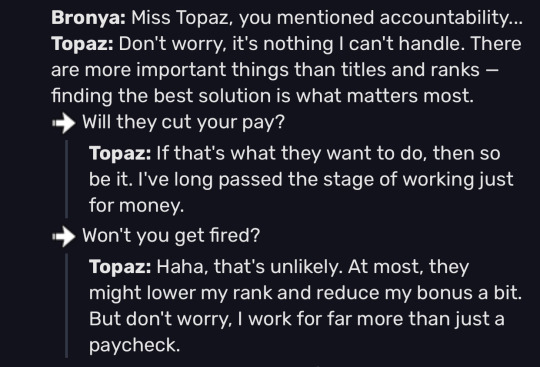
Also, she sees what was done to her planet as a good thing. In her eyes, the IPC saved her planet, in her eyes it isn’t exploitation. She tries to force the same thing on Jarilo-VI to the point she attacks the Astral Express for trying to stop her after Bronya declined the contract. She felt entitled to Jarilo-VI and when she was told no she ignored it. To her, the IPC are the best. It’s no wonder either, as far as we know she hasn’t seen the truly ugly side of the IPC yet because the IPC need her. In her character stories other IPC constantly hype her up, she’s a prodigy, she makes the IPC more efficient. She raises the success rate from 63% to above 80%. Even in her early days we see her breaking rules and getting away with it because the IPC value her too much to lose her.

They don't even question her calculations. Adding to this, when Aventurine is first introduced, it's after she's punished for her actions on Jarilo-VI.

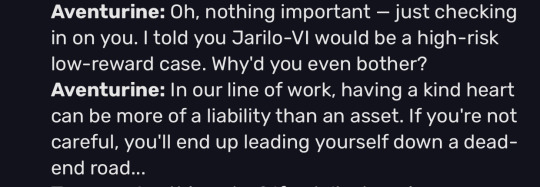
He gives a lot of context about Topaz's power in the IPC. She "dodged a bullet there", implying she theoretically should've got a stronger punishment than being demoted a rank and losing some bonuses she's mentioned she doesn't care about. He even mentions that somebody is "looking out for her". Topaz has backing. He also mentions Jarilo-VI was a high-risk low-reward situation and that her "kind heart" was a liability. Topaz has the room to take on such cases and exercise her "kind heart" because she isn't at risk of losing everything if she screws up. There's little consequences to her actions, there's powerful people protecting her, and the IPC need her. Topaz can leave at any time, she choses not to because she likes the IPC. You see this power dynamic in her character trailer.
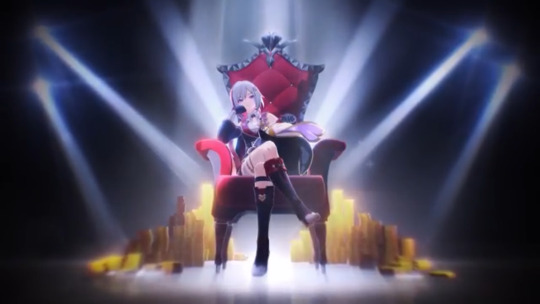
A throne is strong imagery and she's surrounded by money, the real representation of power in the IPC.
So let's talk about Aventurine and why I think he's interesting and why I like him more than Topaz.
Let's start with his power dyanmic within the IPC, or more so, his lack of one.

Aventurine has a serial number on his neck and Dr Ratio specifically calls him a "thrall". The term thrall in this context seems to imply he's a captive of some sort of the IPC*, to them he's a product. We can feel his lack of power in the way people talk to him.
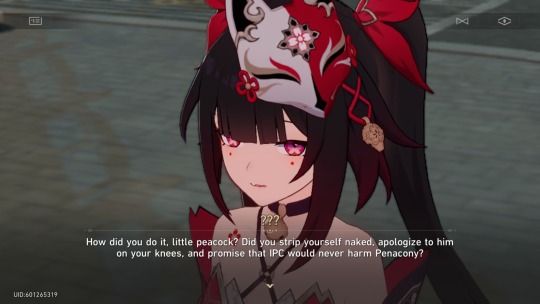
Sparkle speaks to him in a super derogratory way and belittles him by implying he had to humiliate himself to influence Sunday. Meanwhile Dr Ratio writes him off as ruining everything before he gets to really do anything.
He gets power by gambling for it. Power is fleeting and he can lose it easier than most.
At one point he talks about how much money he loses wasting ten minutes. Ten minutes is nothing for Topaz but to Aventurine it's lost money and if he's not making the IPC money he's useless and viable to be cast aside. He can't afford it because he has no power. Compared to Topaz, he can't leave. He has less room for screw ups.
Onto friendship.
When friendship comes up, he keeps the idea at a distance. He asks how friends benefit him. Sparkle says he treats friends like bargaining chips and when he's talking with Dr Ratio he says that "Friends are weapons of Avgins". To him, friends are used for or against you.
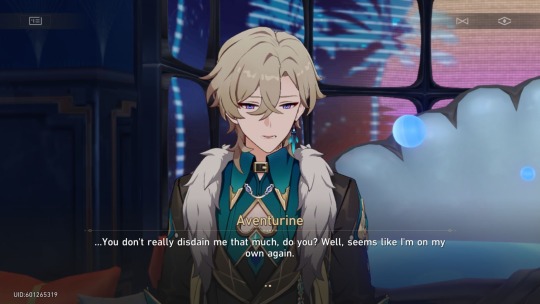
He doesn't have any real friends, he's always on his own. He has no backing. He can't trust anybody because he's in such a vulnerable state and everyone around him looks down on him because of his heritage. Dr Ratio even tells him he causes too much trouble to have freinds, likening him to a peacock with a jarring call.**

Finally I want to analyze this conversation between him and Topaz. When asking for her help, he calls her old friend, implying he's planning to use her. The thing about Aventurine is that compared to Topaz, he's more ruthless because he has to be, he doesn't have the wiggle room she does, even Black Swan notes this saying he'll go to extreme lengths to maintain an advantage. Right now, that's what he's doing because he's being thrown to Penacony as a sacrifice. For the reasons above he seems to be the most expendable Stoneheart. He notes Penacony is a lost cause and Topaz is shocked that the mission isn't given to a higher ranking Stoneheart. He eggs Topaz into being his project manager with the idea she'll recover what she lost on Jarilo-VI. What he's really doing is using her to shield himself. With her involvement the IPC will be less likely to cut their loses with him, because they need Topaz and if he puts his eggs in her basket to care for they're less likely to be left to break by the IPC. If things go wrong he takes the blame… unless he has Topaz to sofen the blow. He's gambling on her power in their dynamic.
*My personal theory as of 2.0 is that the Sigonians and Avgins had a war and the IPC backed the Avgins for a benefit of their victory, assuring it. Aventurine was a captive or some sort of "war prize" hence the serial number and Dr Ratio calling him a thrall. It also explains the negative view of Sigonians and the very favorable view of Avgins among other lore we've gotten about it. I may do a seperate post of this theory.
**Sparkle and Dr Ratio liken Aventurine to a peacock frequently. Male peacocks use their feathers to attract the attention of female peacocks. This matches Aventurine's very flamboyant and charismatic character and his place in the story.
Feel free to add discussion, have a great day, mwah!
#honkai star rail#Penacony#Penacony spoilers#aventurine#topaz#aventurine analysis#topaz analysis#aventurine theory#Aventurine has grown on me I will admit#He fascinates me#Finis Analyzes
208 notes
·
View notes
Text
i have another 2.1 character dynamic post in the recesses of my brain but i need to get this out first
star rail's 2.1 update main plotline leans a lot more into existentialism and absurdism than i thought it would which is a really nice surprise
like i thought before 2.0 that at most it was just going to be some "oh no capitalism bad ipc bad cults also bad" thing but honestly what we got is so much more interesting. the spoilers start now
also massive disclaimer i am not a philosophist and actually i really don't like philosophy because it makes my brain hurt and i would much rather just look at logical nice things like math and plants so. if i get anything wrong please correct me
acheron's past and how she became an emanator of nihility reminds me somewhat of the absurdist theme of how people always look for meaning when there isn't any, until they finally realize that the universe is meaningless
and the entire path of nihility basically is a road towards that realization that people tread on, and the difference between the real world and star rail is that in the real world here we have people who will see that and then go write a book about a guy not crying at his mother's funeral, whereas in star rail it seems that just accepting that the universe is meaningless turns you into a pathstrider or even emanator of the nihility (not sure if i remember the details, correct me if i'm wrong)
and then aventurine's whole motivation is trying to understand why the universe is so cruel to him, and to find meaning when you have everything except freedom, both of which are absurdist themes
the leap of faith argument often attributed to søren kierkegaard claims that even though there is no rational logic for believing in god, you should do it anyway because the alternatives are madness, suicide, and ignorance. this was one solution to the problem of confronting the universe's meaninglessness: choosing to believe in a higher being regardless
later world wars i and ii both contributed heavily to the rise of absurdism as people returned from the war, having seen so many others die around them, and then just going back to a normal society with none of what they as individual soldiers had contributed seemingly doing anything. and then it happened again, but on a much greater scale with even more deaths. both wars and the destruction they brought led many people to start questioning why a supposedly moral god could allow this suffering, and this is where camus comes in and says that actually religion and nationalism both aren't good solutions, and instead we should just accept meaninglessness and keep living despite the absurdity
and i think dr ratio's scroll thing kind of relates to that
he tells aventurine to open it when he's about to die, or when he's completely out of answers for the question of how to confront absurdity
and dr ratio's answer for aventurine is to just tell him to keep living, good luck
which is. yeah
it's the argument that there are more answers to nihilism than just 1) going insane, 2) pretending like it doesn't exist, and 3) dying
it's the bold claim that despite everything, you can still choose to live
sure nothing makes sense but that does not detract from your life. it doesn't need to make sense at all
and with the understanding that things do not need to fit our human definition of meaning, we can continue on knowing our true place in the universe
and with that aventurine walks into the very big black hole like look at that thing you cannot tell me there is no symbolism there

let's go back to acheron.
in the part where you get a snippet of acheron's conversation with some guy just before this cutscene, the other party states that "[IX] leave[s] woven strands of fate for humans to walk, and together THEY weave a great shadow...And this shadow silently envelops them."
which to me sounds like a statement on how people across time and space have again and again come to the same question, what is the meaning of life?
and acheron's whole color thing seems to mean that she is one of the few who, after walking so far on the path of nihility, somehow have not died yet, be it from madness or something else
like it seems implied that many many more have seen the meaninglessness of the universe and have not reacted as well as acheron has
ok i have more to say about the elation and how it in turn relates to the nihility but that will have to come later but there is. a lot of interesting things there to explore
once again disclaimer: I Am Not A Philosophist And Do Not Know What The Correct Definitions Of These Words I'm Throwing Around Are. thank you for coming to my ted talk that was more of a longwinded ramble
#hsr#honkai star rail#2.1 spoilers#hsr aventurine#dr ratio#(briefly but i think i might have more to say about him later once my brain gets working)#acheron#hsr analysis#i should make a tag for that because this is probably not the last time i'm going on a wild tangent about star rail#but bad#bad hsr analysis#someone save me and take me back to the luofu i don't want to be doing english homework while playing a supposedly relaxing upbeat game#or whatever it was that shaoji promised in the 2.0 livestream#i just want to go back and see dan heng and jing yuan and qingque and bailu and you get the point#get me out of this dreamscape.
163 notes
·
View notes
Text
Before Aventurine, it was safe to say that Ratio’s life was not as hectic. He did as he pleased, whether it was working on his current research or simply reading in the bath— his routine revolved around no other than himself.
Now, things were different and out of routine. Ratio was not one who really appreciated being out of routine, so it was safe to say that it was an adjustment. He had gotten used to it being just himself in his apartment, now there was a whole other person; half of his wardrobe was now designated to his lover’s rather colorful attire. Aventurine knew no boundaries either, the blonde was far too quick to criticize his taste in clothes once he had moved in and replaced them with outfits that were “more fitting for a doctor”. Whatever that meant.
Aventurine tested his patience as well— oh, how he loved to test his patience. Whether it was messing with his slides which his students were quick to take notice of. Luckily they all respected (or feared) him enough to not linger on the jokes, however, it didn’t make it any less annoying. Once Aventurine even changed his laptop background to a picture of the two which Ratio hadn’t noticed until he projected his screen for his students to see— it was a decent picture at most, the two comfortable on their couch, Ratio was reading a book while Aventurine leaned against him and took a picture. He rather liked the picture. But it wasn’t for his students' eyes to see!
No matter how many times Ratio warned him to not call or text him during class, Aventurine always did the opposite, insisting that he missed his boyfriend and was eagerly awaiting his return. Ratio wasn’t sure if he was serious or simply just choosing to annoy him by doing exactly what he told him not to. But, whenever Ratio would come home, he would find Aventurine meeting him at the front door, greeting him with a kiss and a “welcome home, Veritas.”
Before Ratio would be met with a hauntingly quiet apartment. Now, there was a whole person awaiting his arrival and asking about his day. Ratio was one who appreciated a nice soak in the bath after work— Aventurine always had one ready for him. “I got some new bath salts that I think you might like. Let me know what you think!” A simple bubble bath was sufficient, but Ratio could not deny that he rather enjoyed the extra little additions… and he appreciated having a companion to enjoy a bath with.
They would rest against each other, not many words spoken as they quietly soaked in the warm water. Every so often Aventurine would ask about Ratio’s day, or what he wished to do in the evening. Afterwards, they would help each other dry off— not that Ratio required the assistance but Aventurine always insisted that they help each other.
After a bath and dinner, Ratio would always require some time to catch up on his research or grade his student’s assignments. That was usually when he would get some alone time in his office while Aventurine caught up with his own work. His office still remained his space, but sometimes he would find little surprises whenever he would walk in.
“Where did these flowers come from?”
Aventurine peered through the door to see Ratio adjusting the vase of assorted flowers on his desk. “I picked some up for you this afternoon. I figured your office could use a little splash of color. Do you like them?”
“Well… they certainly aren’t atrocious,” no one had ever gotten him flowers before— no one ever really cared enough to think about the little things until this gambler weaseled his way into his life.
“Geez, I’m glad you like them,” Aventurine chuckled and turned around to return back to his work, only to be stopped by Ratio who pulled him back and gave him a quick kiss on his forehead.
“Thank you. I appreciate the thought,” a simple statement made the blonde light up, but it was the least he could do to express his gratitude— because no one ever cared to this extent. No one ever cared to check up on him at work. No one ever cared to stay awake and wait for him to join them in bed. No one ever cared for simply wanting to be with him.
Before Aventurine, it was safe to say that Ratio’s life was not as hectic. But without a doubt, Aventurine brought colors into his life, colors he never knew existed until now.
#honkai star rail#hsr#aventurine#dr ratio#ratiorine#veritas ratio#aventio#fluff#relationship analysis#drabble#writing commissions#writing comms open#commissions open
84 notes
·
View notes
Text
what if ratio breaks down and falls apart?
Dr. Ratio (x Aventurine at the end)
warnings: mental breakdown
word count: 1.9k
a/n: lots of ppl seemed to like this idea so here it is, not beta read, ffs come home aventurine
description: Dr. Ratio breaks down (angst), Aventurine mentioned/shows up at one point (fluff dare I say)
his hands shook immensely with the keys in his hand, the heavy doors open and close. he can feel it. he can no longer hold on. being a victim of routine, he manages to push on just a few moments longer, to put away his bag, lock the door, and take off his shoes. few steps through the hallway and it is over. his body trembling as his chest swells up with pain and sadness, so many emotions mixed up in one. filling up in his throat like a peach pit, choking him and making it harder to breathe. he falls to his knees, his breathing heavy, rapid, and irregular. in moments like these, he knows how to take care of himself, how to help himself, how to fix this. but it is too much. he can't. he also... why does everyone get to break down but not him? he can barely breathe in and breathe out, as many thoughts fill his mind.
eyes filling with hot tears except he cannot cry that much, he has always been incapable of actually crying and letting it all out.
like a water dam overflowing and drowning him along with it. the dam filling with water and using it in useful ways until the workers don’t show up, the tools get clogged, old, and broken. the dam overflows. nature always comes back to take its due, to pick up the price, especially human nature.
he isn't enough. he will never be enough. it is a fool's job, what he is trying to achieve. how could he ever spread knowledge everywhere, making it available to everyone? how is that being realistic? hopeful fool, he knows better than to hope. an idiot. a failure. why did he even think he could be capable of doing that? the aeons were right to not recognize him, he isn't worth their attention- he keeps failing. isn't it the definition of insanity to keep doing the same thing over and over and expecting a different outcome? not enough. never enough. such expectations were put on him and he jumped to fulfill them- and when he didn't achieve the last one- to become a true genius, then he failed. failed the mold he was put in. failed the beliefs of everyone around him and their expectations. they were all wrong; everyone who said he could do something, become someone relevant, someone who matters and makes a significant change. and the things he did, well they were never perfect and always could have been done much better. for fuck's sake he fails his students, just how many get the actual knowledge, and how many give up? he isn't good enough, he should be better, and get the knowledge across in a way everyone would accept and know and learn. why is he not good enough? he keeps trying and it is never enough. not once has the universe said, ‘okay, you have done enough, you can rest now.’
why does he keep trying? and he is alone in all of it. who is there who cares for him- who puts his view of self aside, who can.. please.. who can please view him as a human.. a person.. just... as someone who doesn't need to be extraordinary- can he be loved in such a way, appreciated? who would care for him? when all that is said about him is that he is rude, when he only tells the truth and tries to help, he is told that he is insensitive, egotistical, and he is so far from it. why does everybody hate him? aeons, he hates himself. why was he born, created like this? it would've been so much easier to have been born an idiot, dumb, to work a normal job, and be happy.
he stares at an empty spot as these thoughts overtake him, and then he sobs as the next ones come... he wants to be held, oh so much. to be embraced, to be cared for, thought of in a positive way, for his name to be called with love. no one is enough, he isn't enough.
his thoughts keep spiraling in a whirlpool, almost like he is frozen in space. eyes fixed, hands shaking and the occasional warm tear falling down his cheeks, which are now red and hot.
his skin feels like it is burning, the clothes on him overwhelming him but he cannot move, it hurts, it all hurts. why does it hurt so much? this vicious cycle never ends. how could he stand up again when he is falling apart at the seams? is he worth it at all, the life he lives, if he cannot even help himself? he will never be enough. he wants to shout, to yell in frustration and anger- all swallowed in his throat while he continues to sit.. broken on the floor.
his thoughts become more incoherent, how could he.. why.. help.. not enough.. and so on. curses, hatred directed at himself, sorrow, and pity. his ears deaf at any sound, he is so lost in his mind, it is like he isn't even there.
this isn't the first time, but it was never this hard. he picked himself up before; standing, going automatically around his home to take care of his basic needs. but now he has no hope, no care for it, he cannot move. immobile and lost, so… so deep in this vortex.
the doors open and close. there's a voice, he doesn't even register it, “..tas?... home?”
the person makes a few more steps and sees Veritas, sitting on the ground. Veritas manages to register distant footsteps, rushed- it doesn't matter; he isn't even there. only his body is.
the person sits down in front of Veritas and hands him a glass of water. his eyes are unfocused, he appears still, hands on the floor with a slight tremor, cheeks shiny from the tears and a warm red color. instinctively he accepts the glass and drinks the water. the cool fluid makes him consciously blink and float back to the present moment. he registers the voice of the person in front of him.
“Veritas.. I'm here, good- the water is good for you- I'm here, alright?” his eyes focus on the blond man sitting in front of him. Aventurine's eyes are filled with worry and his hands cup Veritas' face, caressing slowly. his voice is calm, “you will be fine- I got you, okay?” Aventurine nods to himself more than to Ratio. his hand moves to the indigo hair, pulling his fingers through the soft locks in a comforting manner. Veritas' eyes are trained on him, full of pain and heartbreak, yet his face is neutral, so hurt.
“your head got to you again? I keep telling you- don't listen to it- it isn't right it only says mean things which aren't true. do you hear me?” the only thing he gets in response is a slow blink from the taller man. and it is enough.
“it tipped over, it isn't as bad as your head claims- don't listen to it, listen to me, focus on me. I’ve got you, I'm here-“ he pulls Veritas into his chest, cradling him in a way. “-and I'm not going anywhere”
fresh tears soak Aventurine's shirt. it hurts to be cared for, to be seen, and for that person to stay and not leave.. it feels undeserving and it just makes him cry harder. he sobs into Aventurine's shoulder, breaking down fully. his voice comes out high-pitched, breaking, “I... I.. it is so hard-” he sobs harder and tightly embraces Aventurine.
“I'm here, you will be okay, this will pass, I have you, don't- don't struggle against them, focus on me, please?” Aventurine pulls away to raise Veritas' chin and meet his eyes, those sunset eyes filled with tears. and he weakly nods.
“focus on me, my voice, Doc, focus on my voice. and I'm warm- you can feel it yes? my chest is warm and my hands- my scent- you can smell the perfume right? focus on me, ground with me. leave that dreadful place- it never did you any good.” he continues using safe words, repeating them, and when Veritas manages to get a grasp on reality once more; he feels empty, numb and Aventurine takes care of him. Aventurine helps him eat a proper meal, bathes with him where he holds him close against his chest, kissing his temple, and repeating that everything will be okay.
Aventurine holds him tightly in bed and whispers only the softest affirmations. before Veritas falls asleep, Aventurine mumbles kind words with his fingers in his hair.
he stays mostly awake that night, just in case Ratio wakes up in distress or from a nightmare. he doesn't mind it. he cares for him, if needed he'd pick his pieces up every day and help him put himself back together. Veritas is his, and he will always be there for him.
the morning turns out to be a slow one. Veritas would tiredly gaze at Aventurine, the blond man asleep into the late morning, and he wouldn't dare start his day- not yet, not now, not without him. Veritas' thoughts are slow this early in the day, they are quiet. he simply observes the younger man. finding some type of solace in it. he doesn't dare touch him as if the beautiful man was a statue made of glass and might break from a single touch.
when his eyes do open he hums and moves to press his face into Veritas' soft chest.
like it is the first time, Ratio is surprised, frozen for a few moments before he relaxes and embraces Aventurine.
“sleep well?”
he nods.
“I rescheduled my stuff, and I hope you will yours too-“, Veritas interrupts him, “..I did.” his voice quiet, monotone.
“today.. today will be easier, okay?” he raises his head, looking up. “I will be with you as long as you need and then some. please be kind to yourself. you need it” he whispers the last sentence and presses his lips into Ratio's cheek.
“I'll try... thank you.. for.. yesterday, dear gambler”
Aventurine nods, “I love you,” he says, easily, as if he didn't have to think those words through before he said them but it conveyed everything he wanted them to say. that he would be there for him, that he'd take care of him, that he would be his.
slight shock is obvious in Veritas’ eyes, that he would be loved gives him a stutter in his response. he feels so vulnerable, bare and naked in front of him. his emotions nude especially after being seen in the state he was in yesterday and despite that... or perhaps specifically because of it... Aventurine said that. with fear, felt on both sides, but also assurance that this is right, that it is a fact he softly says, “I... I love you too.”
beat. both staring into the other's eyes. Veritas cups his cheek. thumb drawing small circles, voice but a whisper, “please don't ever leave me” in that moment he is baren, vulnerable, his cards are on the table for the gambler to gamble off or hold tightly to his chest and fold.
Aventurine answers quickly with a small nervous smile, “the same goes for you too, Doc”
with all those emotions being so loud and scary, Veritas cannot keep up a coy act and even when he does Aventurine sees right through him.
“I promise” Veritas utters and seals it with a soft kiss.
#honkai star rail#dr ratio#hsr#dr ratio angst#analysis#dr ratio fluff#aventurine#aventurine x dr ratio#veritas ratio#aventio#raturine#ratiorine#comfort#veritas ratio angst#hurt/comfort
143 notes
·
View notes
Text
Eidolon art "blueprint"
I've been looking over Eidolons in Star Rail today and thought it'd be fun to try and figure out how exactly the art on them works (i.e. what is the principle behind it, what they have in common between different characters, that sort of stuff).
There will be 1 (ONE) 2.1 story spoiler in here, so beware!
I haven't seen anyone else discuss this, so I've taken it upon myself to write an essay on it! This is relatively small and based entirely on my observations of the art. Feel free to use this as a basis for designing eidolons for your OCs if you want.
There will be example(s) for each part to help visualise the point I'm making as well as descriptions for the ones I'll use (some of the descriptions are much more detailed than others).
Eidolon 1
Shows view of the character from the back 3/4th to the left, up to their shoulders.

Eidolon 2
A close up of either of the character's eyes, showing off the details.

Eidolon 3
The view is entirely unique: the perspective, pose, and focus of the composition is meant to showcase an aspect of the character's personality.
Examples:
● Dan Heng. Back view, focus on his earphones as well as the maple leaf in his hand;
● Silver Wolf. Front view, focus on the game console in her hands;
● Himeko. Front view, focus on her facial expression and the pen in her hand.
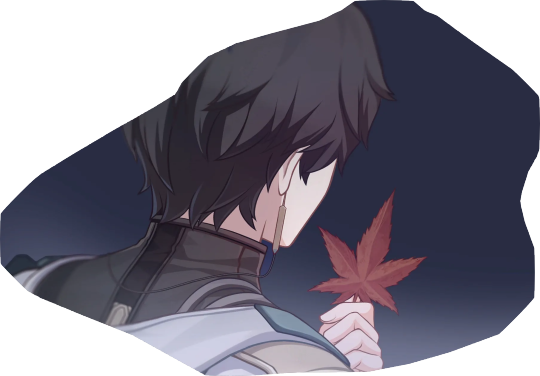

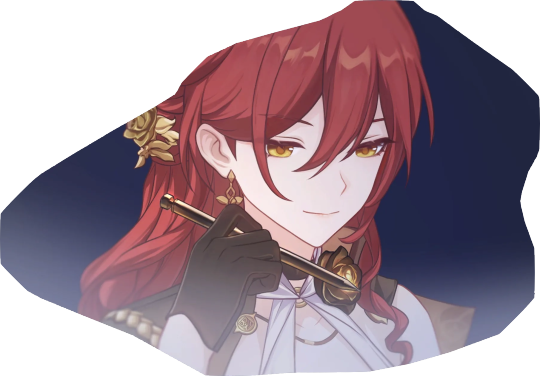
Eidolon 4
Gives view of the character mostly from the front (either full-on or at an angle) or with them facing the camera in some way, up to their shoulders. Often has characters establish eye contact with the camera, but not necessary. Another showcase of their personality possibly might even represent how they interact with others.
Examples:
● March 7th. Back view with her head turned to look at the camera, making a peace sign. She's the only real outlier I've found so far, but it fits her personality fully;
● Aventurine. Front facing the camera, tipping (pulling down?) his hat and hiding one eye behind his hand as a result, obscuring his face;
● Bronya. Front, turned to the right, has a serious listening expression, one hand one her chest, closer to the heart. Perhaps a show of sincerity and dedication.

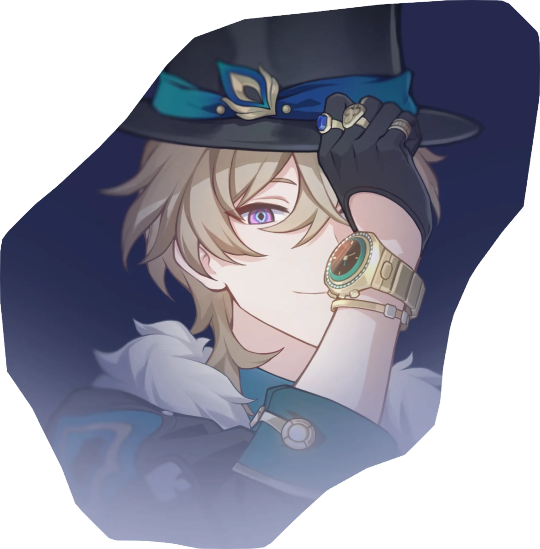
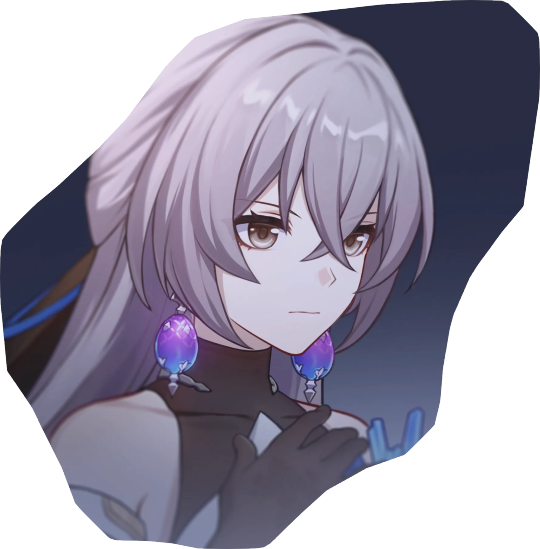
Eidolon 5
A close-up of the character's neck/collarbone area (despite the popular belief, it doesn't actually focus on their chest). The angle varies, as does the amount of character's expression shown, but generally, most of it is obscured (even in fuller pictures).
Examples:
● Herta. 3/4th angle, focus on the key hanging from her choker. The only part of her expression we see is her typical smug little smile;
(This Herta is one of many puppet avatars so the key might be a play on that. She also has a keyhole on the front of her outfit, though they're different sizes. There's also a key on a book cover in her splash art. Another fun fact, her upgrade materials are "Keys" as she is one of the first Erudition characters)
● Dr. Ratio. Focus on the pendant/decoration on his collarbones (maybe the Intelligentsia Guild insignia?), he has that "lips in a thin line" sort of expression;
● Black Swan. Focus on the heart decoration on her collarbones (reference to the stained glass in her ultimate, which in itself, loosely, calls back to Fuli, the Remembrance). She has her slight enigmatic smile.
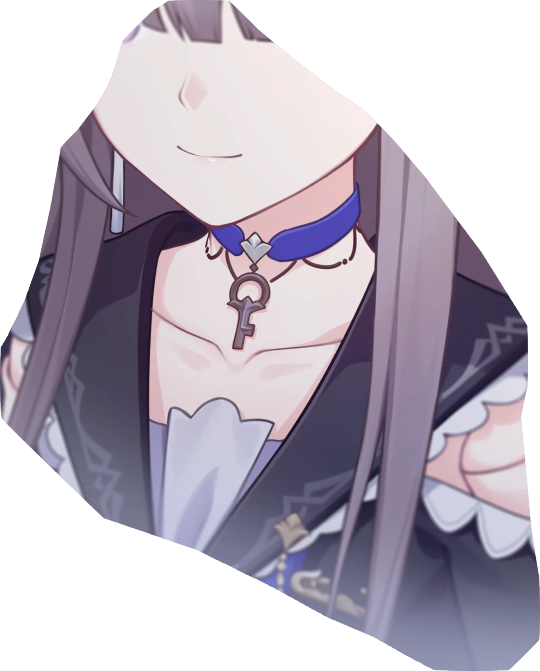
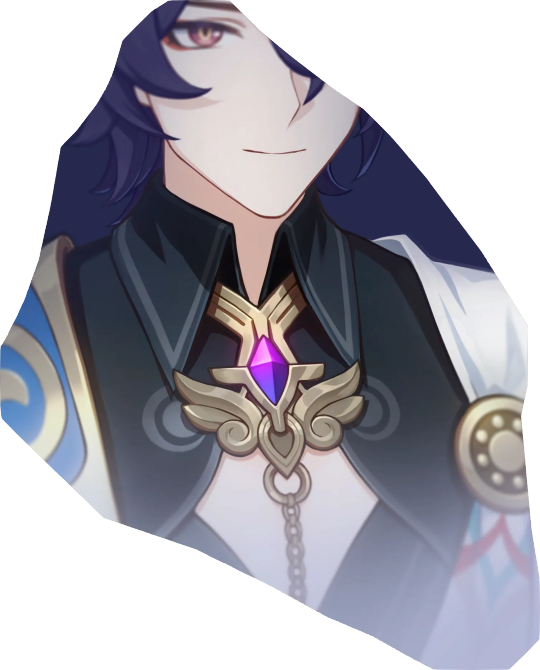

Eidolon 6
Like E3, the view is entirely unique. The only consistent thing is that it ends at about the middle of a character's chest. The character is naked, showing them at their most vulnerable.
Examples:
● Misha. View from the side, his body turned in on itself as he hugs some sort of glowing orb. As a result, he's only illuminated at the points of contact. His expression is relaxed, but there's an interesting amount of seriousness in it, as if he's soothing/protecting the object;
● Sparkle. 3/4th to the left, has her hands up to her chest, one holding onto the other. A red string is tied into a four-petal flower shape around her pinkie finger, which sticks out from the rest of her fingers. Her expression is fully relaxed, her mouth is even slightly open, but the face paint is still on, and her hair is tied up;
● Acheron. View from the front, though her body is slightly turned to the left. She's in her self-annihilator state: hair white, the red thorn-like tattoos surround her lower neck and collarbones. There are red flowers outlined in white, either blooming on or flowing near her, some on her shoulders, some covering her left eye, others flying off. Interestingly, the flowers are placed loosely on a diagonal, bottom left to top right. Her expression is fully relaxed, mouth open slightly, and her hair is flowing to the side. That, paired with the flowers, makes it seem like there's a breeze passing by.

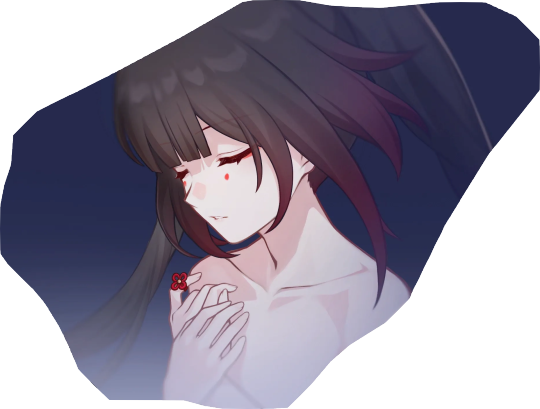

The conclusion I came to, upon finishing this analysis, is that Eidolons can be interpreted as the layers to characters' personality. With E1 being what anyone in the crowd could see – their back, no face, nothing to truly identify them by, and E6 is them at their most relaxed, most open point.
#honkai star rail#hsr#eidolons#analysis#don't mind me tagging literally everything I can#trailblazer#dan heng#silver wolf#himeko#march 7th#aventurine#bronya rand#herta#dr. ratio#black swan#misha#sparkle#acheron
85 notes
·
View notes
Text
Veritas Ratio: The Rogue of Light
Rogue: The passive stealing class
One who steals aspect for others
Alternatively, one who shares or one who redistributes aspect with others
Light
Abstract: Knowledge, Awareness, Attention, Relevance, Fortune, Luck
Literal: Actual Light (Brightness), Vision, Eyes, the Sun, Stars

This is gonna become a series isn't it?
It is. Now let's get going on discussing everyone's favorite interstellar scholar: Dr. Veritas Ratio!!
Let's get the obvious out of the way: His aspect.

Light is more commonly known as the aspect of knowledge. But instead of talking about he’s light-bound personality wise, why don’t we shake things up a bit? We know that he's a smart and knowledgeable man, but what more can his aspect offer for us aside from that?
To fit with Ratio's Greco-Roman theming, I'll briefly discuss the World of Ideas in Plato's allegory of the Cave.
Forgive me to if I do get the allegory wrong and please feel free to correct me!
The gist of this is that ordinary people are like prisoners chained to a cave, only able to perceive reality through shadow puppets and the distorted noises that bounce off the cave walls. These prisoners were born in the cave and had been raised in the cave, not knowing anything else outside of it; ignorance. It's only when they break out of their chains do these prisoners start their path to enlightenment and they achieve it so once they see the bright sun outside of their cave; the World of Ideas.
Ratio seeks to break everyone from the chains of ignorance and guide them towards enlightenment through spreading his knowledge throughout the universe.

Ratio is the man who would forcefully break the prisoners' chains and nudge them towards the light, as much as he could anyways.
And for one specific character, he hopes it is enough.

We'll get back to him later! Next I want to talk about is Ratio and his connection to Christian Gnosticism, which likely had served as inspiration for the concept of the Light aspect in Homestuck. I will be borrowing ideas from one of optimisticDualist's essays so I highly recommend giving it a quick read before continuing onward.
According to Gnostic myth, the world was created through the desires of an aeon named Sophia, an Emanator of light. I should also note that the Greek word for wisdom is Σοφία.
Sophia longed to understand God in His entirety, but in doing so she committed treason and was thus cast out of heaven. Her desire gave birth to Yaldabaoth: a blind, violent, and ignorant god who knew nothing but himself. He created the material world that you and I perceive, shielded from the light of Sophia that birthed him. Because a blind god made the world in his image, the denizens of his earth are also blind to Sophia.
So what do banished gods have to do with the purple guy?
Well, just like Archimedes and screws, things come back around. In order to save yourself from Yaldabaoth’s world, one must be delivered a certain knowledge that is delivered by a “messenger of light” and thus gain the ability to perceive Sophia and her World of Ideas.
In other words, salvation can be sought in what Gnosticism calls a gnosis.
However, one cannot just simply be gifted a gnosis. Those who seek Sophia’s salvation must be driven to reach it, reach beyond the Demiurge’s dark and imprisoning world and into the intangible, bright world above.
Doesn’t that sound familiar?

By Gnostic definition, Ratio should be an Emanator of wisdom, helping curing others of ignorance and helping them on their way towards enlightenment. Hell, you can even say that he's a sylph with all the constant allusions to healing and helping, especially since that Ratio's a Doctor.

However, we all know that this isn't true. Within Ratio's character stories, it can be inferred that his one goal in life is to become an Emanator of the Erudition. His arduous pursuit of knowledge was likely all in hopes in attracting Nous' gaze.
Yet, despite all his efforts, Ratio was never spared a glance

Dr. Ratio is a model Emanator of wisdom by Gnostic standards, yet within his own universe his Aeon of Erudition does not acknowledge him. No matter how hard he tries, he will never reach the status of a member of the Genius society, almost as if he wasn't destined to be a part of it.
Let’s talk about his class: The rogue.
Rogues in Homestuck are the outcasts of their societies. They're loners, isolated, unable to fit in with the groups they want to identify in.
Rogue of Heart Nepeta Leijon lives alone in Alternia's wilderness far from troll society with her lusus as her only companion that is physically close to her.
She's been explicitly described as lonely, creating comics and ships of herself and her friends in order to mitigate her feelings of isolation from other trolls:

Then there's Rogue of Void Roxy Lalonde, who for her first 16 years of life was the only human within her town of carapaces, whom she provides food for. The only other human in her post-apocalyptic world is more than 1700 miles away.
Being a Void-Bound, her isolation is very much apparent, but her loneliness reaches its apex during her bad end in her Pesterquest route. Drinking herself to a stupor as the undeserving consequences of seeing her mother just once consumes her.
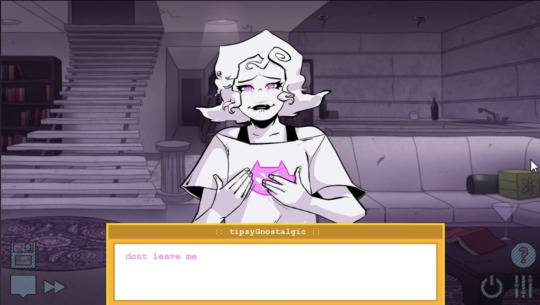
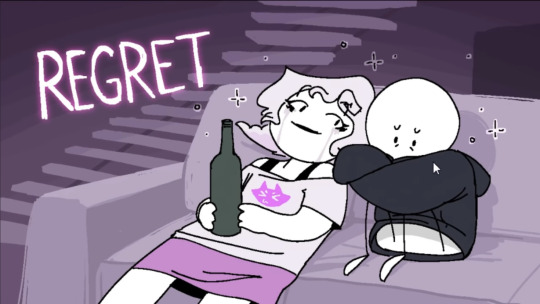
And then Rogue of Breath Rufioh Nitram, who was seen as a mutant for his wings and thus was avoided by his fellow trolls, which took a blow on his self-esteem.

Rogues also struggle with a surplus of their aspect and trying to cope up with that extra while it consumes them. Nepeta taking on the personas of other people through roleplaying, as well as her cave walls being covered in shipping grids. Rufioh living a literally directionless grubhood as travels with a nomadic group called the Lost Weaboos, not to mention his wings, a symbol of freedom, being the cause of why he views himself so lowly. And then there's Roxy, who feels so alone in the carapacian bastion that she fills that void with insobriety, befuddling her mind.
So what does this have to say about Dr. Ratio? All three rogues here have exhibited some type of self-worth issues and a desire to connect with others, but due to being so engulfed by their aspect, it hinders them from reaching that goal...
What if tiny Ratio exhibited such intellect at such a young age that throughout his childhood, he was told that he would be a great scholar growing up? Maybe his genius would earn him a spot within the Genius Society. He was even admitted into a university during his adolescent years.

As that is impressive as that sounds, can you imagine how isolating that can be for a child? Ratio, the only kid in class with his classmates years above him, talking about things outside of academia that he's too young to understand. Meanwhile Ratio likely doesn't interact with those his age as they couldn't provide anything to stimulate his brain. It could also be vice-versa too: Ratio trying to talk to them about topics far beyond their comprehension and they just start to distance themselves from him, unable to understand him, making an outcast out of him.
His intelligence and genius isolates him from making any genuine friendships during his formal years of life. At least, any that we know of before 2.1.
This loneliness does seem to follow him well into his adulthood as well: Becoming a celebrity comes with its own flavor of isolation: being surrounded by the limelight yet no one will truly understand you.
And let's not forget about his ambitions to become an Emanator of the Erudition, to become a member of the Genius Society, which he fell short of...

...something that he holds quite close to his chest, a betrayal of his self-perceived character. He became yet, once again, an outcast.
Another thing, I want you guys to got to Ratio's wiki real quick and see how many characters mention him.
How many people do you think were close to Ratio?
Within the team selection menu of Star Rail, Ratio has lines for when he's added to a team with Ruan Mei and Herta, yet the reverse isn't true. Both Genius scholars say nothing when added to a team with Ratio already in it, almost as if they don't acknowledge him.
There is, however, only one character who says something when added to a team with the Mundanite already in it.
Can you guess who it is?
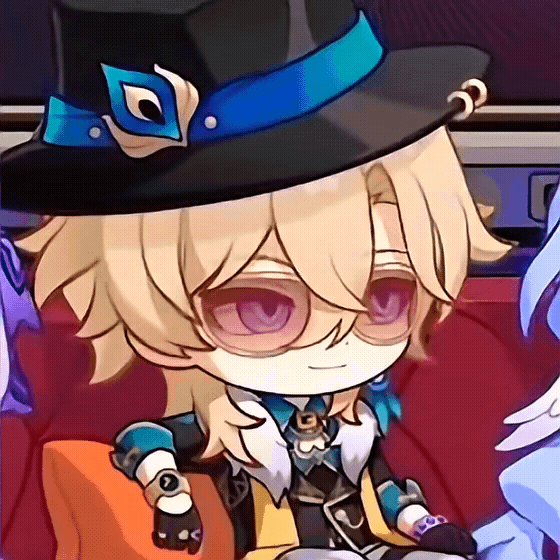
But, as for all classes, their lives aren't meant to be miserable forever. A Rogue must find a way to overcome this loneliness; piecing through the walls of their confines made of their aspect. Instead of just keeping all their aspect for themselves like their Thief counterpart, Rogues find fulfillment through sharing their aspect, often by taking it from one source and distributing it to others. Or in some cases, exchanging something else in order to hand out.
And after all this, I dare say that Ratio joining the Genius Society would be the worst mistake he'd ever make. Stay with me, I have my reasons:
Though we never got to see much of Nepeta in action, we know that she distributes Heart through her shipping chart, arranging couples, distributing aspects of their personalities to see who would go together the best.
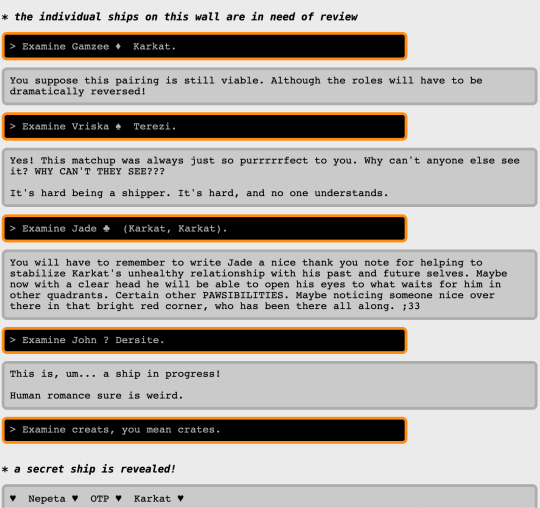
The amount of thought that she puts into her ships puts a Sylph of the same aspect like me to shame!
I digress.
In exchange of bringing attention to the Watterbitch that's about to destroy their game, Roxy was able to obscure the progression of her session from prying eyes, covering it in a blanket of blankness in order to keep Batterwitch from knowing what they're up to.


And then for Rufioh, his Alternian counterpart The Summoner lead a rebellion against the Condecse, using his wings to guide his fellow trolls towards freedom.
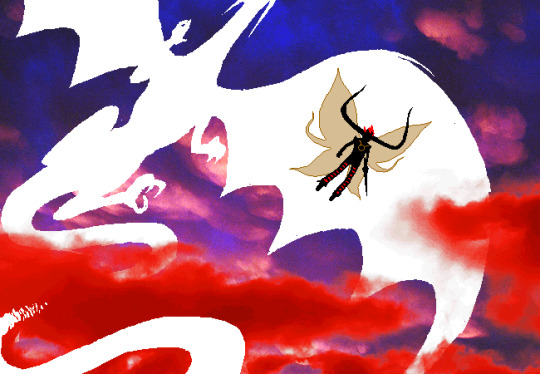
And even after his defeat, his tale lives on as Pupa Pan. While the tale of his rebellious predecessor the Signless is silenced and therefore lost to obscurity, the Summoner's story lives on, allowing the idea of freedom to flow into the mind of young trolls.
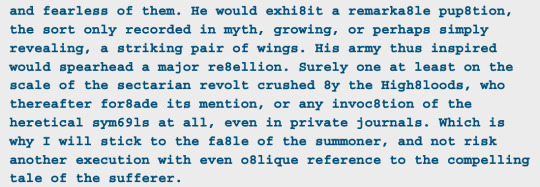
Dr. Ratio's entire character is dedicated to making education accessible for all. Though some of this does end up into his desire to cure people of idiocy, Ratio does truly believe that everyone should get a chance to attain knowledge. I'd even say that his ambition is the reason why he became a professor!

Ratio would dedicate his life towards his goal towards sharing knowledge, even if it meant forsaking Nous' attention in exchange.
His path also affirms this drive. One would expect that someone as knowledgeable as him would be following the path of Erudition, but instead Ratio follows the Hunt.

Ratio's determination to educate, his determination to spread light across the universe manifested into the path he follows. Even if he's never accepted by the Genius Society, he won't let that hinder him or dampen his drive. Ratio just simply strides forward.
The people who make up Nous' faction are described as researchers that rarely interact with each other, and even rarer are the people who are willing to share their research. Ratio would have never found fulfillment in being a member of the Genius Society, I'm almost certain that by joining it he would just be seeking out more and more knowledge, more and more light, becoming more and more isolated.
And one more thing: Rogues are fond of those who manage to get close to them. They appreciate their company and are incredibly dear to them.
For Nepeta, she has Equius.
For Roxy, she has Calliope.
Rufioh had Damara and the Summoner had the Marquise.
So who does Ratio have?
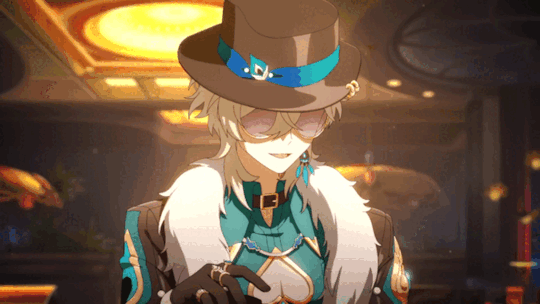
Even outside of a shipping lens, Aventurine is a very important person to Ratio. The 2.1 Penacony story quest demonstrated how much in tandem these two can be together; how much they trusted each other to pull off this huge gamble and draw attention to the death happening in the Planet of Dreams and Festivites. Luck and Knowledge, they both work in perfect harmony.
Aventurine calls him his equal during his episode in “Keeping Up with Star Rail”, claiming that Ratio’s the only one who can understand him.



Ratio and Aventurine must have something closer than just mutual respect however. Before Aventurine goes off into his grandiose self-annihilation, he checks up on him. He risks breaking their façade of disgruntled-coworkers-at-best just to make sure Aventurine can continue on.

Ratio does care for the Stoneheart. So much so that he imparts luck to quite literally the luckiest man alive in hopes that his advice will carry him out of the darkness that he’s in and back into the light. Bringing him out of the blinding Nihility and back into the World of Ideas, back into reality.
And it makes this note all the more important when Aventurine accepts Ratio’s advice, accepting his light when most would brush it off.
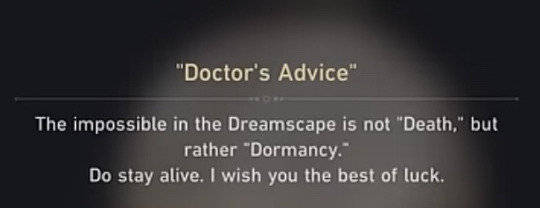
Ratio is a bright person, yet most cannot see past his luminosity and at the same time, he can’t shine bright enough to attract those he aspires to be. To remedy this, the Rogue of Light distributes his lights to others who needs it. He wants to cure those inflicted with ignorance and guide them towards enlightenment.
Knowledge for knowledge’s sake is not his Ratio rolls. His altruism may go against what the Genius Society believes in, but he wouldn’t change his ideals for anyone, steadfast in his determination to cure idiocy.
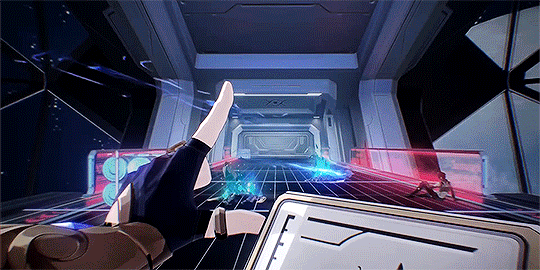
#homestuck#godtiers#classpect#classpect analysis#rogue of light#light aspect#rogue class#hsr#honkai star rail#hsr dr ratio#dr ratio#dr ratio honkai star rail#aventurine honkai star rail#ratiorine
43 notes
·
View notes
Text

found dead on the phone
aventurine, self described.
1.4k words, character study, experimental format, written pre hsr 2.1.
read the full piece at archiveofourown.org/works/54738511.
#POST 2.1: OH MY GOD I CAN SEE THE FUTURE WTF HUHH???#please consider leaving a comment! i will eat them#hsr aventurine#honkai star rail#aventurine#hsr fic#crow.writes#honkai star rail 2.1#penacony#aventurine analysis#for like. my 2 hsr followers lmao
44 notes
·
View notes
Text
DR RATIO ANALYSIS: PART 2, ELECTRIC BOOGALOO
SPOILERS FOR 2.1 CONTENT.
Now, you might be saying - "Aurae, you already did one, why do you need a second?" And my answer is, "LORD, I FORGOT TO TALK ABOUT HOW HIS DEFINITION OF 'IDIOT' IS DIFFERENT. AND ALSO HE DOES NOT HATE AVENTURINE NOR DOES HE THINK AVENTURINE IS STUPID." Once again, here is my disclaimer - although I have been researching psychology for a solid six years, I am NOT a professional. (I will be, one day. Just you wait, just youuuu wait-) So understand that everything I say has been analyzed with personal judgement, with my own conclusions, come to with logic and my personal interpretation. This is just what I have concluded, and you are always free to disagree.
This is my legacy. To be an analyzer. So let's go.
Okay, now that my disclaimer is over, let's take off Ratio's plaster head and chuck it into the sea, and see - what does he mean by 'idiot'?
This will be much shorter than my last, so don't worry - I will not be flashbanging you with another 4k words. This is more like a follow up, than anything else, because there's a few things I wish to touch on.
Dr. Ratio doesn't hate idiots in the sense that he hates people that have 'low IQ' or are 'stupid' in terms of being 'slow to understand'. I definitely touched on this in my last analysis, but he hates people who take their education for granted and don't go places with the gifts that they've been given. He hates "idiots" - "narrow minded" people who have the capabilities to do more and perceive more than they choose to do. People who deliberately look away or take what they know and what they could do for granted. He wants to open people's eyes and allow them to see life from multiple different angles and he believes that everyone should have a chance to learn - with the whole "knowledge for everyone" thing he's got rolling.
He wears a plaster head around people he doesn't seem to know too well in order to think more, or so that he doesn't have to see the faces of the people he dislikes. Pretty good roast. However, he does NOT wear that plaster head around Aventurine. Let's listen to the doctor's judgement - Aventurine is far from stupid. Although he likes to chalk up a lot of the things he does to his own luck, he is an INCREDIBLY capable individual who's managed to get this far because of his own form of genius. He's a man who relies on chance and good fortune, yes, but his charm, his way of scheming, and the way that he's good with people? That's skill. A talent he doesn't take for granted. Dr. Ratio respects him for this - because despite the fact that he has no proper education, he has his eyes wide open to the world and doesn't take shit for granted. He learns what he can in order to survive and he does it fucking well - Aventurine is a very smart man. He's observant, quick on his feet, and great at going with the flow and thinking in the moment.
Aventio aside, I actually believe that Dr. Ratio would be a really good teacher to those who struggle. He's patient where it's needed to be, even if he's got a quick temper, and I believe in his pursuit for knowledge he would do his best to go out of his way to find strategies that would work for their individuals. We're all unique, and he's aware of this - and because he wants to allow people to think for themselves, whatever helps the individual works. Depression? He's got a psych degree, I'm sure bro could give you some strategies. Autism? He has a touch of the 'tism himself. ADHD, and not feeling organized? Bro will help you. It's canon that he's a great fucking teacher - those who finish his classes go on to become successful people who are intelligent and critical thinkers. Round of applause for Ratio, the man that kins my father. He's shit at emotions, but great at knowledge.
Also, on that note, I believe that he would most likely hate parents that push thier "gifted" students to the limit without any compassion for the person that they really are. He's most definitely got some of that academic trauma so I believe that bro holds a secret disdain for parents who just use their children to gain more recgonition. Well, not so secret. He'd cuss them out. (Ratio please cuss out the horrible parents.)
Dr. Ratio, the Teacher ever. (Hey, maybe he'd get along with Kunikida...)
Also, I am definitely planning on making a fic where he teaches Aventurine Latin. As long as you're eager to learn and willing to look past the chalk being thrown, he's got a place for you.
Thanks for coming to my tedtalk. I did not read this through, so this is not edited. Take my unedited rambles.
#aurae analyzes#dr ratio#drratio#veritas ratio#analysis#character analysis#honkai star rail#hsr#aventio#ratiorine#aventurine#dr ratio x aventurine#character study
191 notes
·
View notes
Text
Topaz appreciation post because she’s been rotating around my brain like a rotisserie chicken and I need y’all to get her like I do

Genuinely, I believe her to be the most underrated limited 5 star in the game everything wise, because she is so damn interesting and nobody talks about it ever and it drives me nuts.
So, I’m going to make you understand why exactly I love her and what makes her so amazing in the first place.
Her lore
Topaz’s lore is rather simple, at least compared to other characters in the game, but simple ≠ bad and her story serves her perfectly.
Long before Topaz was Topaz, she was a girl named Jelena, living in a desolate planet at the edge of the galaxy. The economy of this planet was based around mining and industry, which resulted in her home becoming more and more polluted as time went on. The wildlife almost completely disappeared, people had to wear masks to breathe, and it seemed like her planet was reaching a hopeless, dismal end.
Until the IPC came. They promised to fix everything, and heal her planet of its environment problems, in exchange for every person on the planet signing a contract of indentured servitude to the IPC. Seeing no other way out, Topaz’s home accepted, forever tying her and the rest of the planet to the IPC.
Topaz is was (and still is) incredibly talented and competent, excelling in science, economics, finances, math, etc. Her exceptional talents caused her mentor and parental figure Dvorski, who works in the Strategic Investment Department to recommend her to Jade, one of his superiors. Presumably, this is how she started her climb up the corporate latter, eventually becoming the Topaz we know and love today.
Throughout this, she maintained her friendly and headstrong attitude, and never abandoned her love for animals or the people in her life like Dvorski, a trait which will be important for later.
So, I’ve established the basics, so what makes this interesting?
Topaz’s trauma and how it affects her character
I feel like a lot of people ignore just how much trauma she really has, and how it affects the way she behaves in the present.
For starters, her love of animals. Sure, Numby is adorable and in general this is a rather fun trait for a character to have, it’s not something you would consider to be a sign of something darker.
However, remember that Topaz’s planet almost lost all of the life on it, and she witnessed firsthand almost every creature she knew and loved either go extinct or become severely endangered.
So, when you view her love for animals through this lense, it’s easy to see that she’s so attached to animals because Topaz almost lost them forever, and this trait manifests in a lot of the behavior she exhibits.
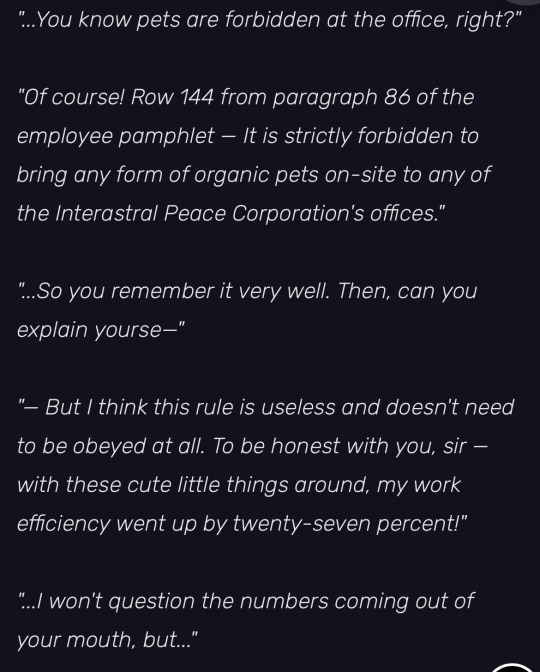
According to Topaz herself, her efficiency goes up 27% when Numby is with her, and it seems to be blatantly obvious that being around animals give her at the very least a peace of mind/sense of comfort. I mean in game she is Topaz and Numby for a reason, and her relationship with them is a core part of the way she behaves. When Topaz can’t ground herself, she has Numby to help her with that, which hurts even more considering she is likely going on these missions alone 90% of the time, meaning her literal only friend is a pet/animal.
Considering Topaz’s biological parents never get mentioned, it’s not hard to assume she is orphaned or at the very least estranged from them, likely due to the disaster on her planet, leaving her only loved ones to be her pets and Dvorski. Losing one half of the only support system she has would be devastating for Topaz, which is likely why she brings Numby everywhere (also considering I don’t think she has mentioned him in the present, her pets might literally be the only things she has left).

In her own home, Topaz collects a myriad of species from across the galaxy, as if to preserve them so at least even if they disappear on their home planets like hers did, they won’t go extinct entirely.
Personally, I think her fixation around them cooperating and coexisting also reflects on how she feels about other people. If animals from completely different planets can get along, so can people. If she can convince creatures lacking in intellect work together, then she can do the same for ones that possess it, as ultimately Topaz is a massive people person, and believes what she’s doing is best for the galaxy.
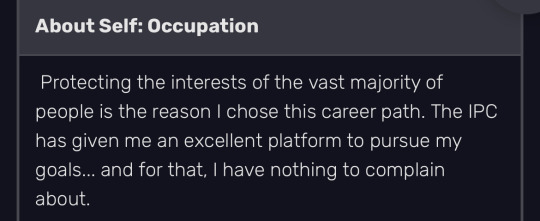
It’s almost like an experiment, with every little change to their ecosystems, every new organism added, every new abiotic feature taken or removed, Topaz can simulate what that might be like in reality. In a way she wants to take care of humans like she does her pets, however instead of doing it through her own means, she uses the IPC and her power as a Stoneheart as a vector for that.
But why is she so confident? What makes Topaz wholeheartedly believe that what she’s doing really is the best for the galaxy, even if we know it isn’t perfect, even if only ~80% of the planets she works on are “saved”?
Well, like always, it’s her trauma again.
Imagine you’re living on a planet slowly dying due to its people’s greed and ignorance, in which everything you know and love is falling apart, and absolutely nothing can be done about it. But you don’t need to imagine this, I mean this is a situation we are all going through, as it’s already what’s happening to our planet right now, so perhaps instead picture what it might be like to live here in a few decades if nothing changes. How miserable that would be, how upset you would be at those in power, how disappointed you would be in humanity for doing Nothing when we had so much time and already knew the consequences almost a century in advance (seriously we have known about climate change since like the 50s).
So you give up hope and accept your fate, accept that everything is going down in flames and the humanity, the planet you know and love is going to be snuffed out forever.
Only to get saved when an outside influence comes to your assistance. Sure, they make everyone sign a contract binding their lives to them, but you wouldn’t have a life to give had they not helped. Besides, you owe it to every other thing that shares your planet with you, every plant, every animal, every organism has been utterly wiped out by human greed, so it’s only fair to pay them back, right?
I mean it’s your whole world at stake, so how could you say no? How could you deem their terms unreasonable if clearly your own people didn’t deserve the responsibility they had over their own lives? If their situations could only be fixed by giving it to others who could guide them? By giving it to the IPC? The Preservation ?
This is the mindset Topaz grew up on and has known for her entire life. She has seen humanity utterly fail itself and is unwilling to allow that fate to befall others. She doesn’t trust other people to make the right decisions, she doesn’t think they know what’s best for them, because the people she was closest to, her very own people couldn’t do that, so how could she ever expect strangers to do the same?
How could she ever give the leaders of these planets the benefit of the doubt, knowing that doing that for her own almost caused it to be wiped out completely? How could she see them as anything more than the selfish bastards who ruined everything? How could her heart not ache thinking there were people on the planets she helps who would be doomed to experience the fate that almost fell upon her had Topaz not stepped in.
How could Topaz feel guilty over the planets that don’t succeed? The ones she can’t save? As after all, she thinks they were lost from the get go? Does it eat her up at night knowing she failed them? That she couldn’t prevent the folly of humanity this time, so the next planet she must work harder, be more stubborn, push back even more, so nobody ever experiences what she did instead?
I mean being an indentured servant hasn’t been that bad for her, she’s succeeded in every endeavor she’s set her mind to after all. Sure, she’s entirely alone, and sure, if the IPC no longer deems her or her people useful, they could cast them aside once again.
But Topaz is smart, she climbed to the top of the latter, she’s been praised to hell and back, she’s known far and wide through the department for her efficiency and drive, surely she hasn’t done anything wrong?
Sure she’s heard whispers, rumors and projects of other departments, of the deep dark secrets of the company she owes her life too. Inwardly she wonders how those who follow the Preservation would even be willing to commit such atrocities, inwardly she hopes they are just rumors. The IPC saved her planet, so how could they destroy others?
The Preservation’s power will protect all, will save them from their miserable existences. Nothing else matters in the process, no dissenter understands this as like Topaz does. She will save them, she will protect them, even if it means she is detested by everyone she encounters, it must be done. All for the Amber Lord.
I find it very compelling how despite the fact that Topaz has become a Stoneheart, she is still dressed in the fashion of an average IPC worker. As if she is an equal part of the puzzle as them. Equally useful, equally disposable, equally biased, equally ignorant, and equally foolish.
I mean, how could she be anyway else?
Her future
Belabog was just as important for Topaz’s development as she was to it.
She was wrong.
As stubborn as Topaz is, she is not arrogant, and when Bronya proved to her that the people of Belabog can and would fight for their future, Topaz did everything in her power to help them.
As that’s what she really cares about, people.
I think Topaz the determination she has in Bronya and it shook her to her core.
Because so far, the only way Topaz has seen real progress is from the hands of the IPC.
But Bronya doesn’t give into them, and she puts everything she has into saving her people. Moreover, Jarilo-VI follows the Preservation as well, but they don’t agree with the IPC’s method of it.
Is the IPC wrong?
That is the question Topaz is faced with, what is the thing she has to grapple with once she leaves the planet. When they demote her for not getting the debt back immediately, does Topaz wonder why they were so concerned about that in the first place? Shouldn’t they be happy that a world blessed by their very own deity managed to pick itself up without their help? Isn’t that the point?
Does she think back to her previous projects, the planets she saved and the planets she failed, and wonder how it would have worked out without the IPCs involvement?
Did Aventurine teasing her about “failing” the Jarilo-VI project confuse her, because they were still saved like Topaz wanted them to be in the first place? How could they ever be considered a failure?
She believes debts and payback are what holds planets together, but it only ever seemed to cause Belabog to fall apart.
This is the first time Topaz really is forced to reevaluate her priorities, to question if her methods are justifiable, if she’s really doing the right thing.
Belabog didn’t break her, it didn’t topple her worldview and turn everything on its head, but it did plant some seeds of doubt in her brain, seeds of doubt that will grow into a new mindset.
HOYOVERSE IF YOU ARE LISTENING HOYOVERSE, GIVE HER THE MENTAL BREAKDOWN + PRIORITY REEVALUATION ARC SHE DESERVES!!! DO THAT AND MY LIFE IS YOURS PLEASE.
Like you don’t get it you don’t get it what do you mean they set all this up and they might not go anywhere with it. Please hoyo please please please let her break away from the IPC’s condition and warped perspective, please let her truly follow the Preservation, please make her turn away from them, please make her an emanator of Preservation after she does this. Topaz stoneheart form, Topaz emanator form. Please please please let her save the crew let her save her subordinates let her save the people she failed previously let her save Aventurine and Ratio let her save Numby let her save herself.
Her instability
I have already somewhat touched on this in point #3, but Topaz just cannot exist in the state she is now permanently.
Like a radioactive element she’s going to slowly decay over time until she ends up in a more stable form, and who that will hurt in the process, and how long that will take, we will have to see.
Hypocrisy is not something that can exist for long within characters, as due to its inherent contradictions, it messes with the way they are characterized until they are eventually forced to either eliminate it themselves or have the story do it for them.
Topaz is a hypocrite, desiring to do good and help people, but she ends up hurting them in the process.
However, she has only just begun to realize this, and as more and more of the IPC’s atrocities get revealed, it gets harder and harder for both the audience and her herself to justify her behavior as we witness the extent of their crimes.
So how has she remained this stable for so long?
Well, the IPC has done everything in their power to keep her that way. From a young age she was involved with them, as they not only saved her planet, but her only known parental figure worked in the Strategic Investment Department. Soon, he recommended her to Jade due to Topaz’s exceptional talent, and presumably the other Stoneheart quickly picked her up and took her under her wing, causing Jelena to rise fast within the ranks and become one herself.
The IPC has been Topaz’s only frame of reference for how things should be done, her only perspective on write and wrong for so long. The only hints she gets of other points of view are that of the people who destroyed her planet, her own people. Unintentional or not, Topaz has been made to feel her whole life like the IPC are heroes and the common people are foolish and greedy and evil, and only now has that worldview started to crumble piece by piece.
Sure, we have always known how terrible the IPC was, a perception that has only gotten more and more true over time. However, Topaz is not the audience, and in universe the IPC presents themselves in a very positive light.
Think of the Myriad Celestia trailer and how it portrays the IPC; that’s quite literally how they want to be viewed in game, how they market themselves to other people. If Topaz has only ever known them to be that great, shining, progressive company who vows to follow the Preservation and improve the universe, how could even begin to criticize them? After all, she had never known any other perspective. Even when she did fail in the past, Topaz viewed it as a strike on her own record and an unfortunate situation in general, not as a demonstration of the IPC’s misdeeds.
The IPC is good, the IPC saves people, the IPC follows the Preservation, Topaz is a good person, Topaz does good things, Topaz helps people, Topaz saves people, there is nothing wrong, there won’t ever be anything wrong.
Until Belabog
They don’t want to cooperate with the IPC. To roll over and let themselves be gutted for all they are worth.
Well that’s fine, that’s happened before, at least that’s how Topaz justifies it to herself. She thinks of their massive debt, it must be paid after all, otherwise how could the galaxy remain stable?
But the weapons the IPC gave Jarilo-VI were never used in its defense. The thing they owe the IPC for never ended up being valuable. Belabog stood on its own, without the help of IPC in its defense.
They saved themselves.
As if it couldn’t get worse, they did it with the power of the Preservation.
And it didn’t come from the IPC, it came from them.
The Interastral Peace Corporation, who claim to be followers of the Preservation, standing against people who really do have their blessing and being proved wrong.
Do you know how that would feel to Topaz.
She’s wrong, and she’s proven wrong by the very deity she claims to follow, she believes she follows.
So Topaz makes her choice.
Stick with the IPC’s plan, or stand with the people of Belabog
And she stands with them.
Topaz’s character never changes. I hate when people act like she switched up on them and changed her whole worldview, but in reality that was the most in character thing Topaz has ever done in her entire life.
Because she cares about people, so when the opportunity presents itself, she will always stand with them.
This is the first time Topaz goes against the IPC’s wishes, and it won’t be the last.
She made her choice, she demonstrated who and what she truly cares about, and that will only drive a wedge between her and the IPC further and further until she snaps.
I find it funny how Topaz is a fire type character, when the song core to Belabog’s themes is “Wildfire”
However, maybe it isn’t just about them. I think it’s about the Preservation, about what the game in general is trying to tell its players.
How fighting for your right to exist will hurt, but it is not impossible, and that pain will be the only way to enact change.
Well, Topaz,
you made your choice
go fight against your fate
Thank you so much for reading! I really enjoyed making this and I hope you at least understand why I think Topaz is such a compelling character. I need an arc centered on her in the future and if I don’t get one then trust me things will be dealt with. She will get her just desserts.
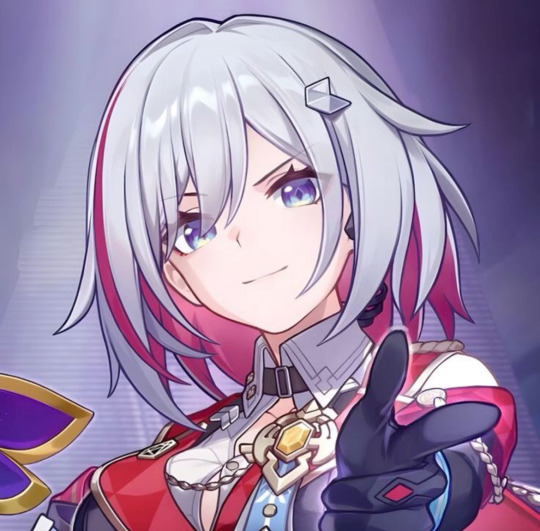
#honkai star rail#hsr#hsr analysis#topaz hsr#topaz#topaz honkai star rail#topaz and numby#Im insane about her I was tweaking while writing this#This community does not deserve Topaz#aventurine#dr ratio#I need to make a post on the parallels between the IP3#They are so so so important to one another though#I hate when ppl downplay that#THE NARRATIVE PARALLELS GRRRRR#ppl need to acknowledge just how hard the IPC fucked up her too#Like it’s more obvious with Aven and Boothill but still
33 notes
·
View notes
Text
AVENTURINE RAMBLE ALERT!!!
tw: suicidal tendencies/ideation?
let me know if i should add anything because im not used to needing to add this stuff-
im usually goofy abt him but ive been thinking about this for a while now
aventurine puts quite the emphasis when he tells us that he doesn't make deals he can lose

yet he doesn't seem to hesitate to risk his life, doing it willingly even, like in the final victor light cone where it was down right unnecessary

sorry pal but no sane man would do that, it's almost like he craves to 'lose' one of these gambles, like dying would be a kind of victory in and of itself.
and in a way, taking his backstory into consideration, it does kind of make sense...? he doesn't have anything to live for other than being the sole survivor of the massacre. he was bought as a slave because he was lucky enough to survive. he climbed the ranks because he was lucky enough to win the bets he made, the bets he made in hopes of regaining his freedom. but at some point it wasn't about regaining his freedom anymore. even as one of the stonehearts, all he is is a chip for the ipc. and he's accepted it.

he cant get out of the system (unless he dies) and he's accepted that he's just a tool. it's even mentioned in his first meeting voiceline.
"Your humble servant Aventurine at your disposal, just a cog in the machine called the IPC's Strategic Investment Department. Nevertheless, I can also play the role of friend if needed"
(wow promoted from slave to servant)
before the thrill of the gambles was 'If i win this, i'll finally have a little more freedom' but now it's are 'if i lose this, i'll lose it all' (a part of me considers that this is where kakavasha became aventurine)
he's a coward in his own way to me. i think the majority can agree that this man is suicidal (HE FUCKING ATTEMPTED MULTIPLE TIMES JUST TO 'CHECK' IF YOU COULD ACTUALLY DIE IN THE DREAMSCAPE WTF??) but he's suicidal in the way that although he does want to end his life, he's too scared to do it directly by his own hands.
but also perhaps it's not just fear. as the only avgin left he also feels the burden of making sure his people don't just 'go extinct' (for lack of a better word). his family put so much faith in him before they left. would it really be ok for him to give up like that?


(side note: he mentioned before he didnt really appreciate the rain. perhaps the two are related?)
so instead, comparable to a person who stops checking for cars before crossing the road, he gambles, willingly risking his life, in hopes that his luck will eventually run out by itself...
i love him guys. i promise.
#i feel like i just typed out a whole loadda nonsense#i hope this wasnt too serious or anything...#i feel oddly bad abt posting this#babbles#hsr#honkai star rail#aventurine#hsr aventurine#aventurine hsr#badly written char analysis?#star rail#kakavasha
157 notes
·
View notes
Text
I hate when characters I don’t like grow on me like fungus because if I extend even a moment of analysis toward them they just latch onto my brain and infect it. Like no Aventurine I don’t care how much pathetic wet cat energy you have I’m warding you off with a steel chair stop being more interesting the more I think about the implications of your lore
#honkai star rail#aventurine#I automatically don’t trust characters that work for the IPC directly#And I guess I was expecting him to be like Topaz#Who works for them voluntarily and thinks they’re the best thing ever#But Aventurine seems to be very isolated and his working for the IPC doesn’t seem to be of his own volition#I might do an analysis on him some time when we know more#But he’s growing on me
61 notes
·
View notes